Wikileaks and The Age of Transparency - PDF
VerifiedAdded on 2021/06/14
|22
|6445
|28
AI Summary
Contribute Materials
Your contribution can guide someone’s learning journey. Share your
documents today.
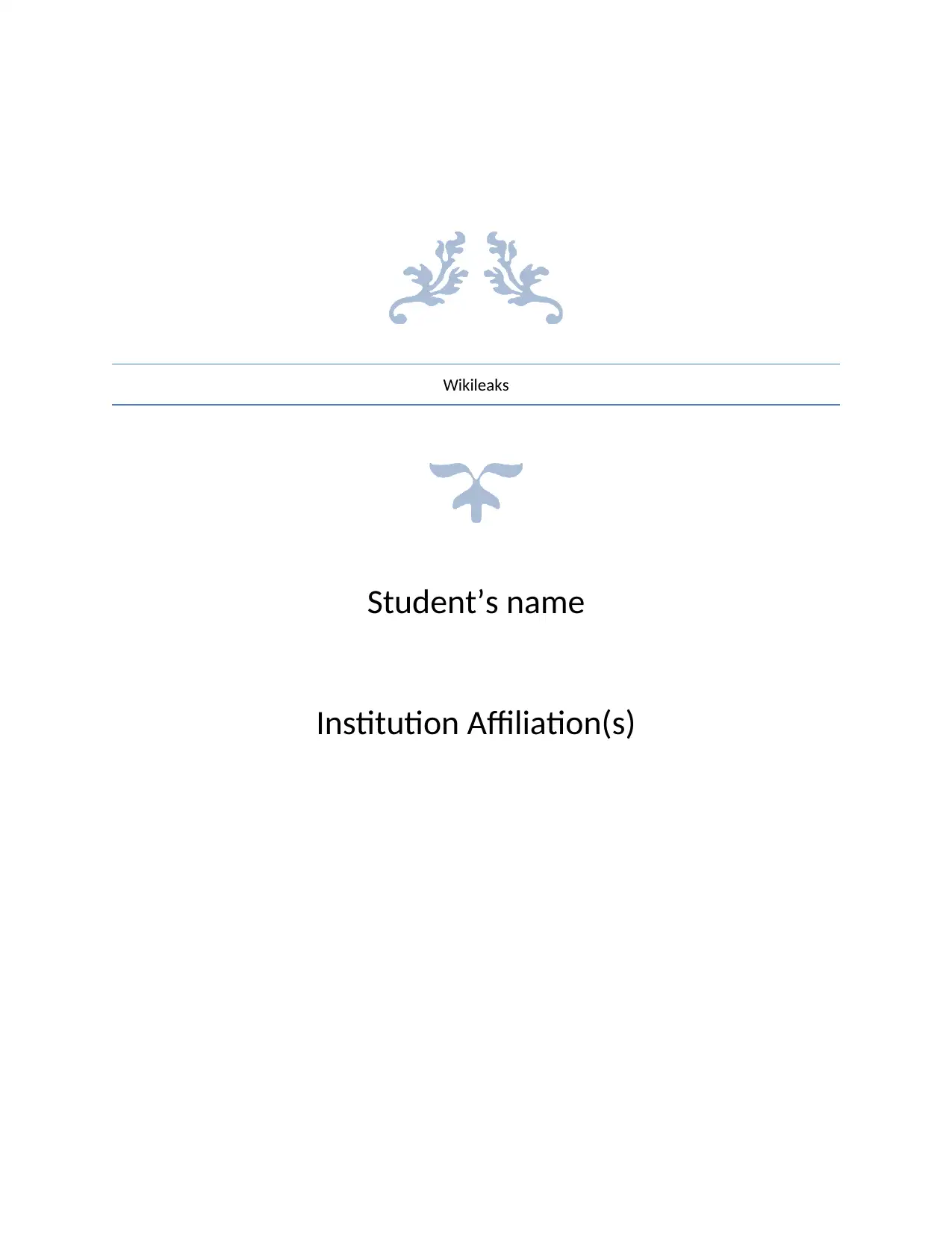
Wikileaks
Student’s name
Institution Affiliation(s)
Student’s name
Institution Affiliation(s)
Secure Best Marks with AI Grader
Need help grading? Try our AI Grader for instant feedback on your assignments.
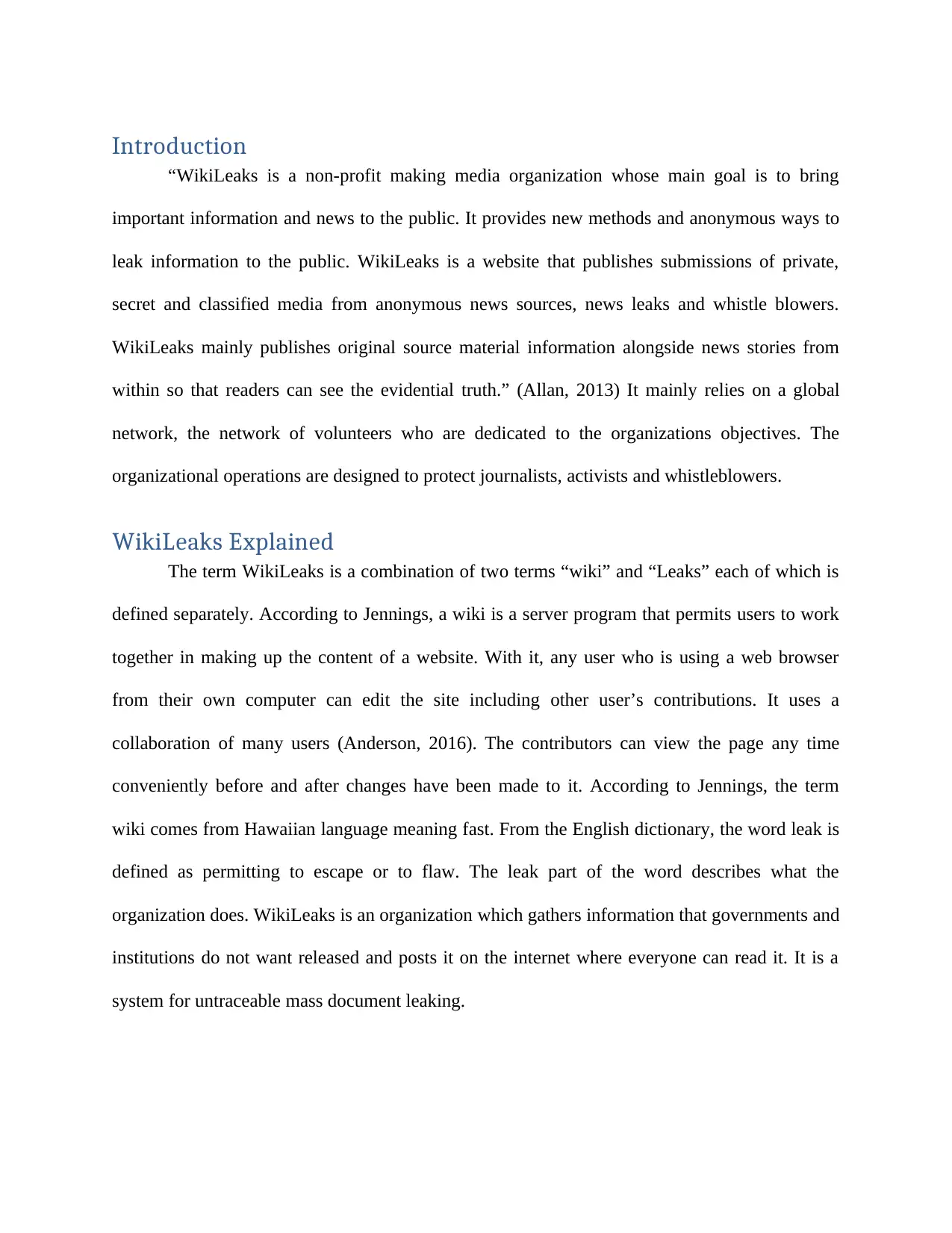
Introduction
“WikiLeaks is a non-profit making media organization whose main goal is to bring
important information and news to the public. It provides new methods and anonymous ways to
leak information to the public. WikiLeaks is a website that publishes submissions of private,
secret and classified media from anonymous news sources, news leaks and whistle blowers.
WikiLeaks mainly publishes original source material information alongside news stories from
within so that readers can see the evidential truth.” (Allan, 2013) It mainly relies on a global
network, the network of volunteers who are dedicated to the organizations objectives. The
organizational operations are designed to protect journalists, activists and whistleblowers.
WikiLeaks Explained
The term WikiLeaks is a combination of two terms “wiki” and “Leaks” each of which is
defined separately. According to Jennings, a wiki is a server program that permits users to work
together in making up the content of a website. With it, any user who is using a web browser
from their own computer can edit the site including other user’s contributions. It uses a
collaboration of many users (Anderson, 2016). The contributors can view the page any time
conveniently before and after changes have been made to it. According to Jennings, the term
wiki comes from Hawaiian language meaning fast. From the English dictionary, the word leak is
defined as permitting to escape or to flaw. The leak part of the word describes what the
organization does. WikiLeaks is an organization which gathers information that governments and
institutions do not want released and posts it on the internet where everyone can read it. It is a
system for untraceable mass document leaking.
“WikiLeaks is a non-profit making media organization whose main goal is to bring
important information and news to the public. It provides new methods and anonymous ways to
leak information to the public. WikiLeaks is a website that publishes submissions of private,
secret and classified media from anonymous news sources, news leaks and whistle blowers.
WikiLeaks mainly publishes original source material information alongside news stories from
within so that readers can see the evidential truth.” (Allan, 2013) It mainly relies on a global
network, the network of volunteers who are dedicated to the organizations objectives. The
organizational operations are designed to protect journalists, activists and whistleblowers.
WikiLeaks Explained
The term WikiLeaks is a combination of two terms “wiki” and “Leaks” each of which is
defined separately. According to Jennings, a wiki is a server program that permits users to work
together in making up the content of a website. With it, any user who is using a web browser
from their own computer can edit the site including other user’s contributions. It uses a
collaboration of many users (Anderson, 2016). The contributors can view the page any time
conveniently before and after changes have been made to it. According to Jennings, the term
wiki comes from Hawaiian language meaning fast. From the English dictionary, the word leak is
defined as permitting to escape or to flaw. The leak part of the word describes what the
organization does. WikiLeaks is an organization which gathers information that governments and
institutions do not want released and posts it on the internet where everyone can read it. It is a
system for untraceable mass document leaking.
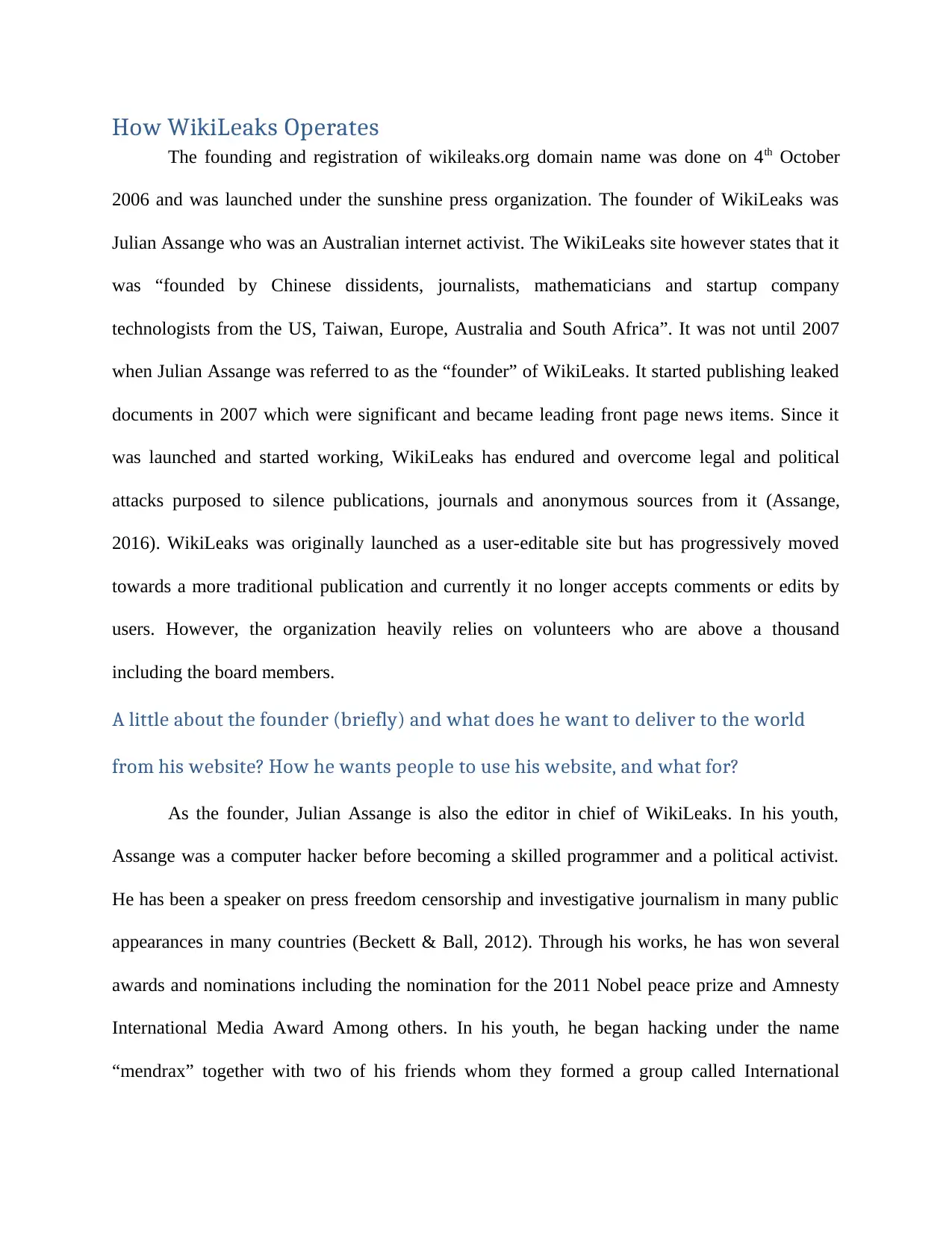
How WikiLeaks Operates
The founding and registration of wikileaks.org domain name was done on 4th October
2006 and was launched under the sunshine press organization. The founder of WikiLeaks was
Julian Assange who was an Australian internet activist. The WikiLeaks site however states that it
was “founded by Chinese dissidents, journalists, mathematicians and startup company
technologists from the US, Taiwan, Europe, Australia and South Africa”. It was not until 2007
when Julian Assange was referred to as the “founder” of WikiLeaks. It started publishing leaked
documents in 2007 which were significant and became leading front page news items. Since it
was launched and started working, WikiLeaks has endured and overcome legal and political
attacks purposed to silence publications, journals and anonymous sources from it (Assange,
2016). WikiLeaks was originally launched as a user-editable site but has progressively moved
towards a more traditional publication and currently it no longer accepts comments or edits by
users. However, the organization heavily relies on volunteers who are above a thousand
including the board members.
A little about the founder (briefly) and what does he want to deliver to the world
from his website? How he wants people to use his website, and what for?
As the founder, Julian Assange is also the editor in chief of WikiLeaks. In his youth,
Assange was a computer hacker before becoming a skilled programmer and a political activist.
He has been a speaker on press freedom censorship and investigative journalism in many public
appearances in many countries (Beckett & Ball, 2012). Through his works, he has won several
awards and nominations including the nomination for the 2011 Nobel peace prize and Amnesty
International Media Award Among others. In his youth, he began hacking under the name
“mendrax” together with two of his friends whom they formed a group called International
The founding and registration of wikileaks.org domain name was done on 4th October
2006 and was launched under the sunshine press organization. The founder of WikiLeaks was
Julian Assange who was an Australian internet activist. The WikiLeaks site however states that it
was “founded by Chinese dissidents, journalists, mathematicians and startup company
technologists from the US, Taiwan, Europe, Australia and South Africa”. It was not until 2007
when Julian Assange was referred to as the “founder” of WikiLeaks. It started publishing leaked
documents in 2007 which were significant and became leading front page news items. Since it
was launched and started working, WikiLeaks has endured and overcome legal and political
attacks purposed to silence publications, journals and anonymous sources from it (Assange,
2016). WikiLeaks was originally launched as a user-editable site but has progressively moved
towards a more traditional publication and currently it no longer accepts comments or edits by
users. However, the organization heavily relies on volunteers who are above a thousand
including the board members.
A little about the founder (briefly) and what does he want to deliver to the world
from his website? How he wants people to use his website, and what for?
As the founder, Julian Assange is also the editor in chief of WikiLeaks. In his youth,
Assange was a computer hacker before becoming a skilled programmer and a political activist.
He has been a speaker on press freedom censorship and investigative journalism in many public
appearances in many countries (Beckett & Ball, 2012). Through his works, he has won several
awards and nominations including the nomination for the 2011 Nobel peace prize and Amnesty
International Media Award Among others. In his youth, he began hacking under the name
“mendrax” together with two of his friends whom they formed a group called International
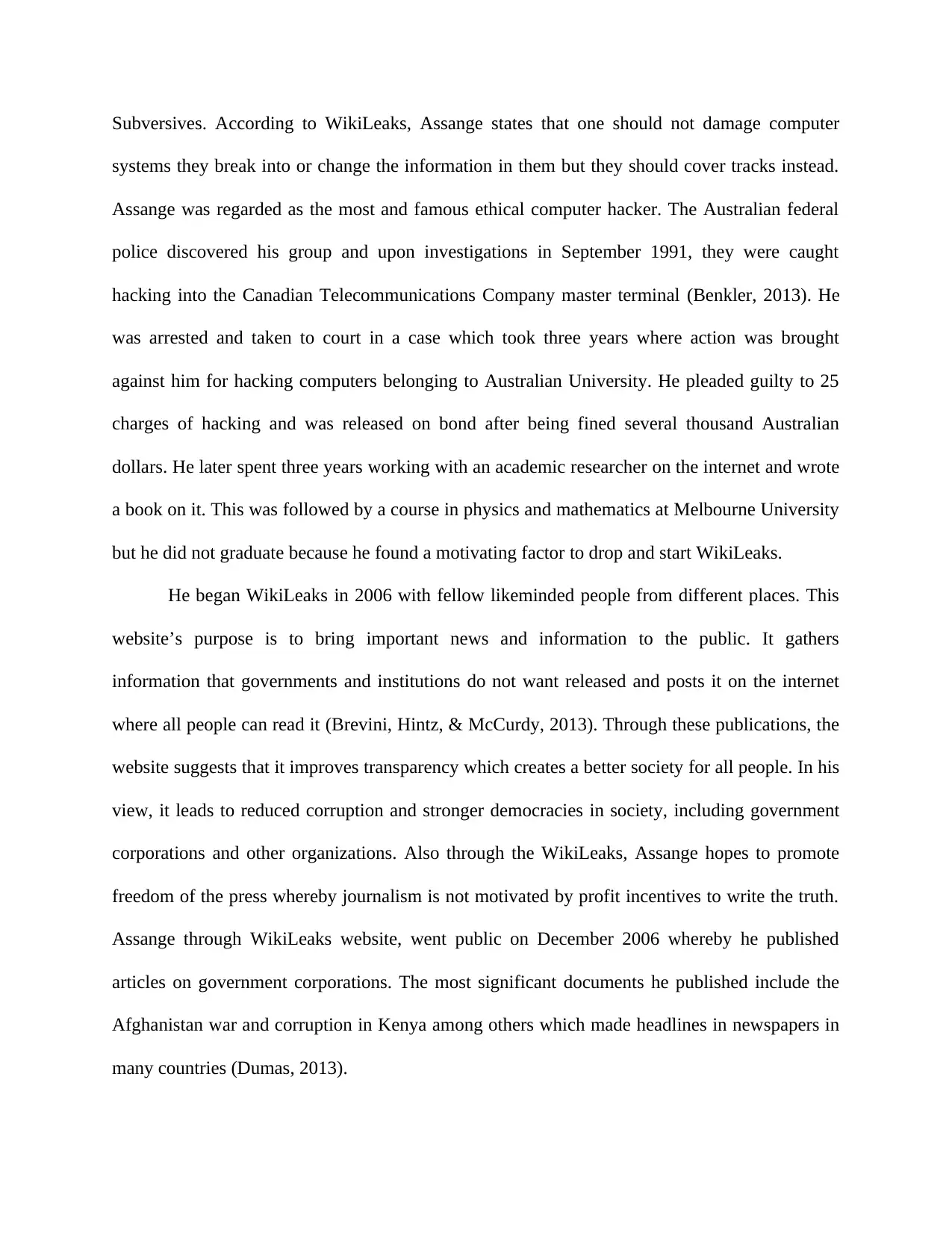
Subversives. According to WikiLeaks, Assange states that one should not damage computer
systems they break into or change the information in them but they should cover tracks instead.
Assange was regarded as the most and famous ethical computer hacker. The Australian federal
police discovered his group and upon investigations in September 1991, they were caught
hacking into the Canadian Telecommunications Company master terminal (Benkler, 2013). He
was arrested and taken to court in a case which took three years where action was brought
against him for hacking computers belonging to Australian University. He pleaded guilty to 25
charges of hacking and was released on bond after being fined several thousand Australian
dollars. He later spent three years working with an academic researcher on the internet and wrote
a book on it. This was followed by a course in physics and mathematics at Melbourne University
but he did not graduate because he found a motivating factor to drop and start WikiLeaks.
He began WikiLeaks in 2006 with fellow likeminded people from different places. This
website’s purpose is to bring important news and information to the public. It gathers
information that governments and institutions do not want released and posts it on the internet
where all people can read it (Brevini, Hintz, & McCurdy, 2013). Through these publications, the
website suggests that it improves transparency which creates a better society for all people. In his
view, it leads to reduced corruption and stronger democracies in society, including government
corporations and other organizations. Also through the WikiLeaks, Assange hopes to promote
freedom of the press whereby journalism is not motivated by profit incentives to write the truth.
Assange through WikiLeaks website, went public on December 2006 whereby he published
articles on government corporations. The most significant documents he published include the
Afghanistan war and corruption in Kenya among others which made headlines in newspapers in
many countries (Dumas, 2013).
systems they break into or change the information in them but they should cover tracks instead.
Assange was regarded as the most and famous ethical computer hacker. The Australian federal
police discovered his group and upon investigations in September 1991, they were caught
hacking into the Canadian Telecommunications Company master terminal (Benkler, 2013). He
was arrested and taken to court in a case which took three years where action was brought
against him for hacking computers belonging to Australian University. He pleaded guilty to 25
charges of hacking and was released on bond after being fined several thousand Australian
dollars. He later spent three years working with an academic researcher on the internet and wrote
a book on it. This was followed by a course in physics and mathematics at Melbourne University
but he did not graduate because he found a motivating factor to drop and start WikiLeaks.
He began WikiLeaks in 2006 with fellow likeminded people from different places. This
website’s purpose is to bring important news and information to the public. It gathers
information that governments and institutions do not want released and posts it on the internet
where all people can read it (Brevini, Hintz, & McCurdy, 2013). Through these publications, the
website suggests that it improves transparency which creates a better society for all people. In his
view, it leads to reduced corruption and stronger democracies in society, including government
corporations and other organizations. Also through the WikiLeaks, Assange hopes to promote
freedom of the press whereby journalism is not motivated by profit incentives to write the truth.
Assange through WikiLeaks website, went public on December 2006 whereby he published
articles on government corporations. The most significant documents he published include the
Afghanistan war and corruption in Kenya among others which made headlines in newspapers in
many countries (Dumas, 2013).
Paraphrase This Document
Need a fresh take? Get an instant paraphrase of this document with our AI Paraphraser
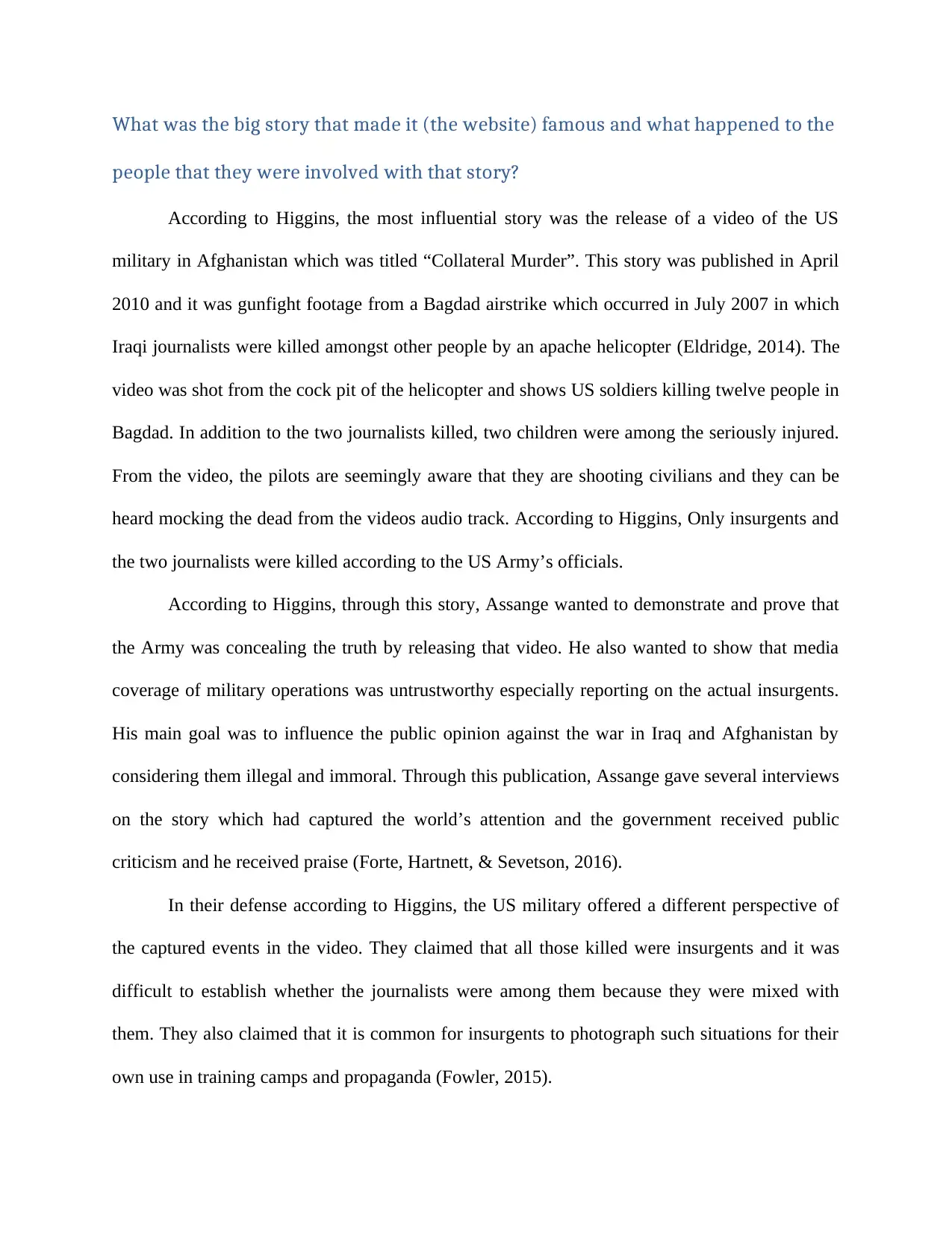
What was the big story that made it (the website) famous and what happened to the
people that they were involved with that story?
According to Higgins, the most influential story was the release of a video of the US
military in Afghanistan which was titled “Collateral Murder”. This story was published in April
2010 and it was gunfight footage from a Bagdad airstrike which occurred in July 2007 in which
Iraqi journalists were killed amongst other people by an apache helicopter (Eldridge, 2014). The
video was shot from the cock pit of the helicopter and shows US soldiers killing twelve people in
Bagdad. In addition to the two journalists killed, two children were among the seriously injured.
From the video, the pilots are seemingly aware that they are shooting civilians and they can be
heard mocking the dead from the videos audio track. According to Higgins, Only insurgents and
the two journalists were killed according to the US Army’s officials.
According to Higgins, through this story, Assange wanted to demonstrate and prove that
the Army was concealing the truth by releasing that video. He also wanted to show that media
coverage of military operations was untrustworthy especially reporting on the actual insurgents.
His main goal was to influence the public opinion against the war in Iraq and Afghanistan by
considering them illegal and immoral. Through this publication, Assange gave several interviews
on the story which had captured the world’s attention and the government received public
criticism and he received praise (Forte, Hartnett, & Sevetson, 2016).
In their defense according to Higgins, the US military offered a different perspective of
the captured events in the video. They claimed that all those killed were insurgents and it was
difficult to establish whether the journalists were among them because they were mixed with
them. They also claimed that it is common for insurgents to photograph such situations for their
own use in training camps and propaganda (Fowler, 2015).
people that they were involved with that story?
According to Higgins, the most influential story was the release of a video of the US
military in Afghanistan which was titled “Collateral Murder”. This story was published in April
2010 and it was gunfight footage from a Bagdad airstrike which occurred in July 2007 in which
Iraqi journalists were killed amongst other people by an apache helicopter (Eldridge, 2014). The
video was shot from the cock pit of the helicopter and shows US soldiers killing twelve people in
Bagdad. In addition to the two journalists killed, two children were among the seriously injured.
From the video, the pilots are seemingly aware that they are shooting civilians and they can be
heard mocking the dead from the videos audio track. According to Higgins, Only insurgents and
the two journalists were killed according to the US Army’s officials.
According to Higgins, through this story, Assange wanted to demonstrate and prove that
the Army was concealing the truth by releasing that video. He also wanted to show that media
coverage of military operations was untrustworthy especially reporting on the actual insurgents.
His main goal was to influence the public opinion against the war in Iraq and Afghanistan by
considering them illegal and immoral. Through this publication, Assange gave several interviews
on the story which had captured the world’s attention and the government received public
criticism and he received praise (Forte, Hartnett, & Sevetson, 2016).
In their defense according to Higgins, the US military offered a different perspective of
the captured events in the video. They claimed that all those killed were insurgents and it was
difficult to establish whether the journalists were among them because they were mixed with
them. They also claimed that it is common for insurgents to photograph such situations for their
own use in training camps and propaganda (Fowler, 2015).
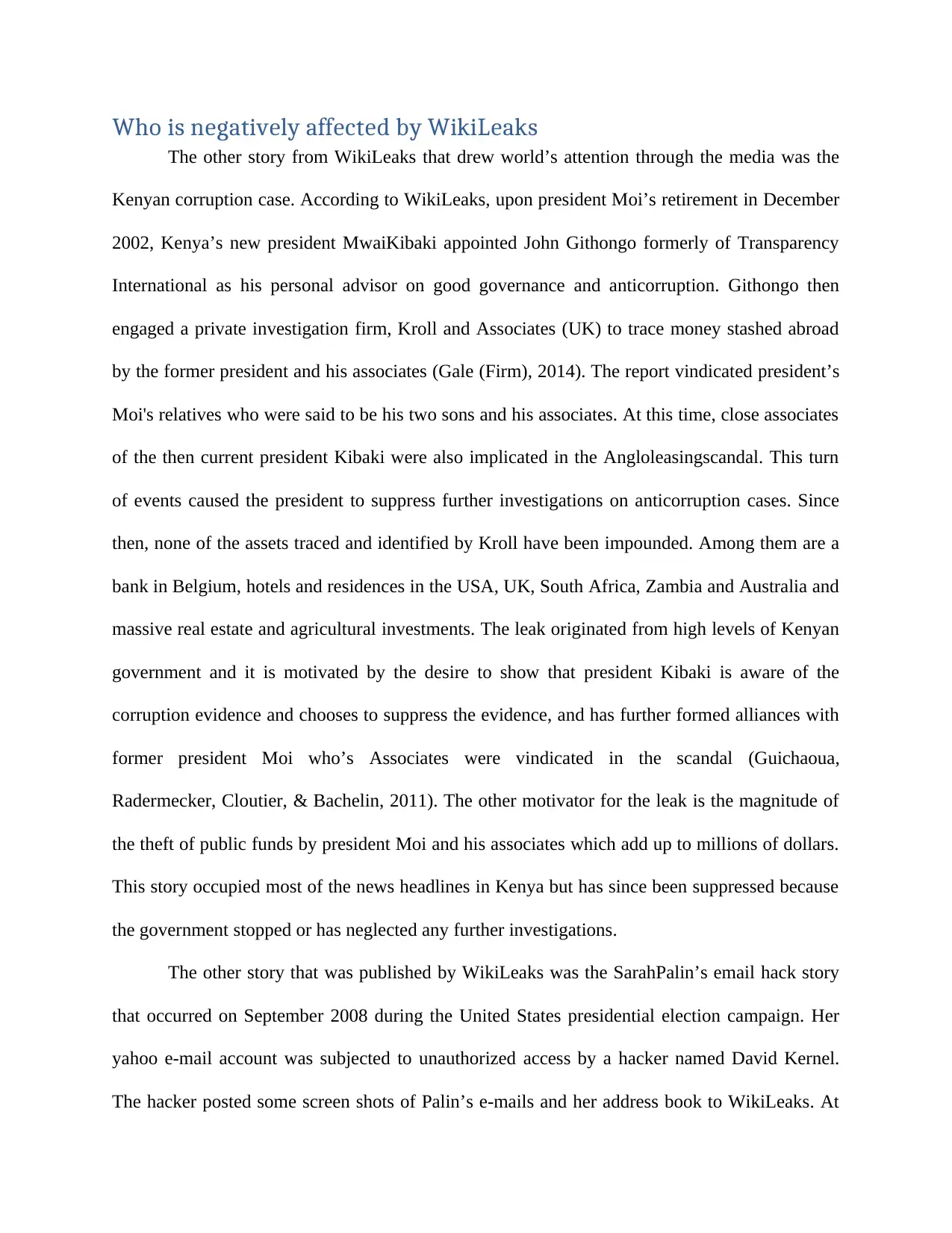
Who is negatively affected by WikiLeaks
The other story from WikiLeaks that drew world’s attention through the media was the
Kenyan corruption case. According to WikiLeaks, upon president Moi’s retirement in December
2002, Kenya’s new president MwaiKibaki appointed John Githongo formerly of Transparency
International as his personal advisor on good governance and anticorruption. Githongo then
engaged a private investigation firm, Kroll and Associates (UK) to trace money stashed abroad
by the former president and his associates (Gale (Firm), 2014). The report vindicated president’s
Moi's relatives who were said to be his two sons and his associates. At this time, close associates
of the then current president Kibaki were also implicated in the Angloleasingscandal. This turn
of events caused the president to suppress further investigations on anticorruption cases. Since
then, none of the assets traced and identified by Kroll have been impounded. Among them are a
bank in Belgium, hotels and residences in the USA, UK, South Africa, Zambia and Australia and
massive real estate and agricultural investments. The leak originated from high levels of Kenyan
government and it is motivated by the desire to show that president Kibaki is aware of the
corruption evidence and chooses to suppress the evidence, and has further formed alliances with
former president Moi who’s Associates were vindicated in the scandal (Guichaoua,
Radermecker, Cloutier, & Bachelin, 2011). The other motivator for the leak is the magnitude of
the theft of public funds by president Moi and his associates which add up to millions of dollars.
This story occupied most of the news headlines in Kenya but has since been suppressed because
the government stopped or has neglected any further investigations.
The other story that was published by WikiLeaks was the SarahPalin’s email hack story
that occurred on September 2008 during the United States presidential election campaign. Her
yahoo e-mail account was subjected to unauthorized access by a hacker named David Kernel.
The hacker posted some screen shots of Palin’s e-mails and her address book to WikiLeaks. At
The other story from WikiLeaks that drew world’s attention through the media was the
Kenyan corruption case. According to WikiLeaks, upon president Moi’s retirement in December
2002, Kenya’s new president MwaiKibaki appointed John Githongo formerly of Transparency
International as his personal advisor on good governance and anticorruption. Githongo then
engaged a private investigation firm, Kroll and Associates (UK) to trace money stashed abroad
by the former president and his associates (Gale (Firm), 2014). The report vindicated president’s
Moi's relatives who were said to be his two sons and his associates. At this time, close associates
of the then current president Kibaki were also implicated in the Angloleasingscandal. This turn
of events caused the president to suppress further investigations on anticorruption cases. Since
then, none of the assets traced and identified by Kroll have been impounded. Among them are a
bank in Belgium, hotels and residences in the USA, UK, South Africa, Zambia and Australia and
massive real estate and agricultural investments. The leak originated from high levels of Kenyan
government and it is motivated by the desire to show that president Kibaki is aware of the
corruption evidence and chooses to suppress the evidence, and has further formed alliances with
former president Moi who’s Associates were vindicated in the scandal (Guichaoua,
Radermecker, Cloutier, & Bachelin, 2011). The other motivator for the leak is the magnitude of
the theft of public funds by president Moi and his associates which add up to millions of dollars.
This story occupied most of the news headlines in Kenya but has since been suppressed because
the government stopped or has neglected any further investigations.
The other story that was published by WikiLeaks was the SarahPalin’s email hack story
that occurred on September 2008 during the United States presidential election campaign. Her
yahoo e-mail account was subjected to unauthorized access by a hacker named David Kernel.
The hacker posted some screen shots of Palin’s e-mails and her address book to WikiLeaks. At
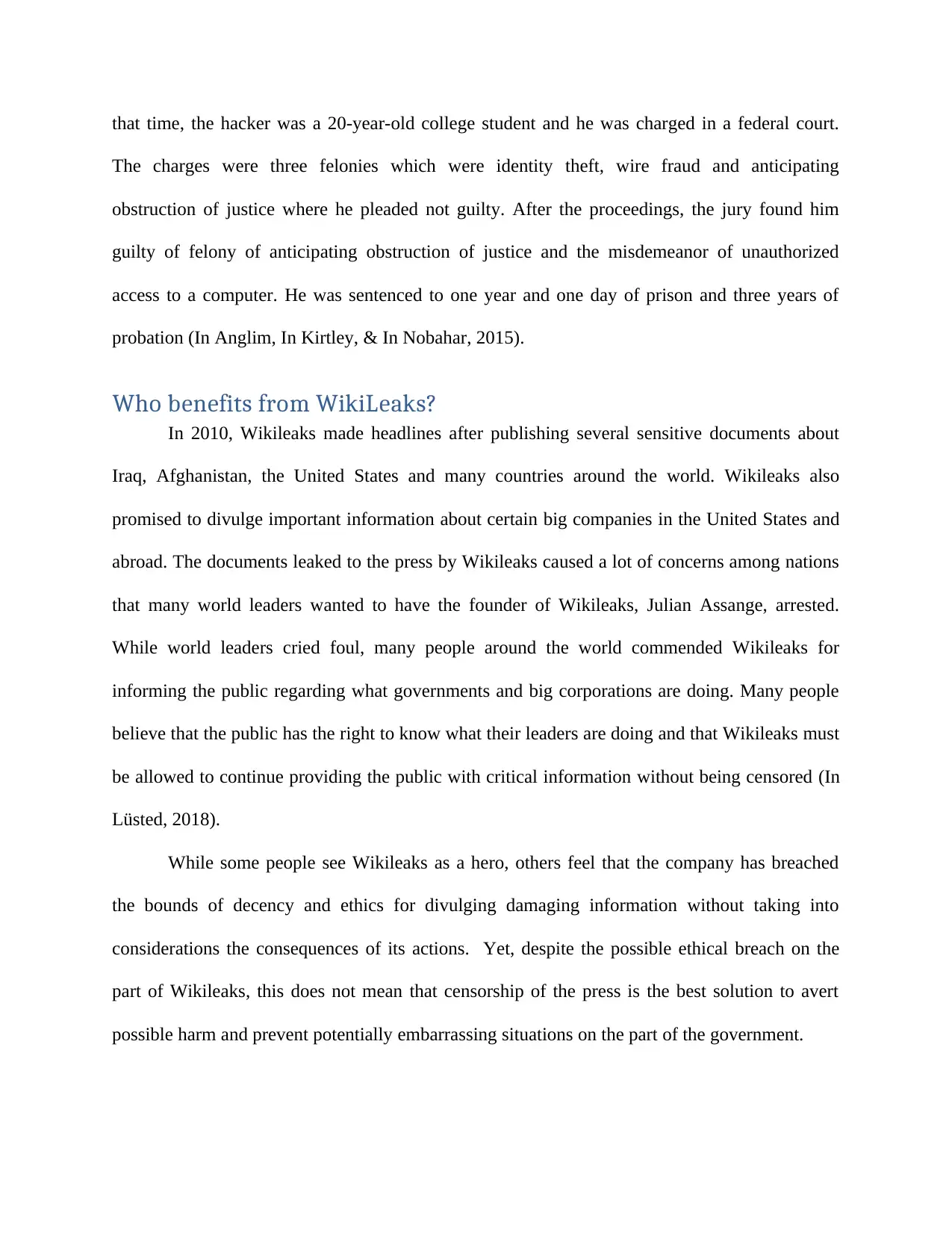
that time, the hacker was a 20-year-old college student and he was charged in a federal court.
The charges were three felonies which were identity theft, wire fraud and anticipating
obstruction of justice where he pleaded not guilty. After the proceedings, the jury found him
guilty of felony of anticipating obstruction of justice and the misdemeanor of unauthorized
access to a computer. He was sentenced to one year and one day of prison and three years of
probation (In Anglim, In Kirtley, & In Nobahar, 2015).
Who benefits from WikiLeaks?
In 2010, Wikileaks made headlines after publishing several sensitive documents about
Iraq, Afghanistan, the United States and many countries around the world. Wikileaks also
promised to divulge important information about certain big companies in the United States and
abroad. The documents leaked to the press by Wikileaks caused a lot of concerns among nations
that many world leaders wanted to have the founder of Wikileaks, Julian Assange, arrested.
While world leaders cried foul, many people around the world commended Wikileaks for
informing the public regarding what governments and big corporations are doing. Many people
believe that the public has the right to know what their leaders are doing and that Wikileaks must
be allowed to continue providing the public with critical information without being censored (In
Lüsted, 2018).
While some people see Wikileaks as a hero, others feel that the company has breached
the bounds of decency and ethics for divulging damaging information without taking into
considerations the consequences of its actions. Yet, despite the possible ethical breach on the
part of Wikileaks, this does not mean that censorship of the press is the best solution to avert
possible harm and prevent potentially embarrassing situations on the part of the government.
The charges were three felonies which were identity theft, wire fraud and anticipating
obstruction of justice where he pleaded not guilty. After the proceedings, the jury found him
guilty of felony of anticipating obstruction of justice and the misdemeanor of unauthorized
access to a computer. He was sentenced to one year and one day of prison and three years of
probation (In Anglim, In Kirtley, & In Nobahar, 2015).
Who benefits from WikiLeaks?
In 2010, Wikileaks made headlines after publishing several sensitive documents about
Iraq, Afghanistan, the United States and many countries around the world. Wikileaks also
promised to divulge important information about certain big companies in the United States and
abroad. The documents leaked to the press by Wikileaks caused a lot of concerns among nations
that many world leaders wanted to have the founder of Wikileaks, Julian Assange, arrested.
While world leaders cried foul, many people around the world commended Wikileaks for
informing the public regarding what governments and big corporations are doing. Many people
believe that the public has the right to know what their leaders are doing and that Wikileaks must
be allowed to continue providing the public with critical information without being censored (In
Lüsted, 2018).
While some people see Wikileaks as a hero, others feel that the company has breached
the bounds of decency and ethics for divulging damaging information without taking into
considerations the consequences of its actions. Yet, despite the possible ethical breach on the
part of Wikileaks, this does not mean that censorship of the press is the best solution to avert
possible harm and prevent potentially embarrassing situations on the part of the government.
Secure Best Marks with AI Grader
Need help grading? Try our AI Grader for instant feedback on your assignments.
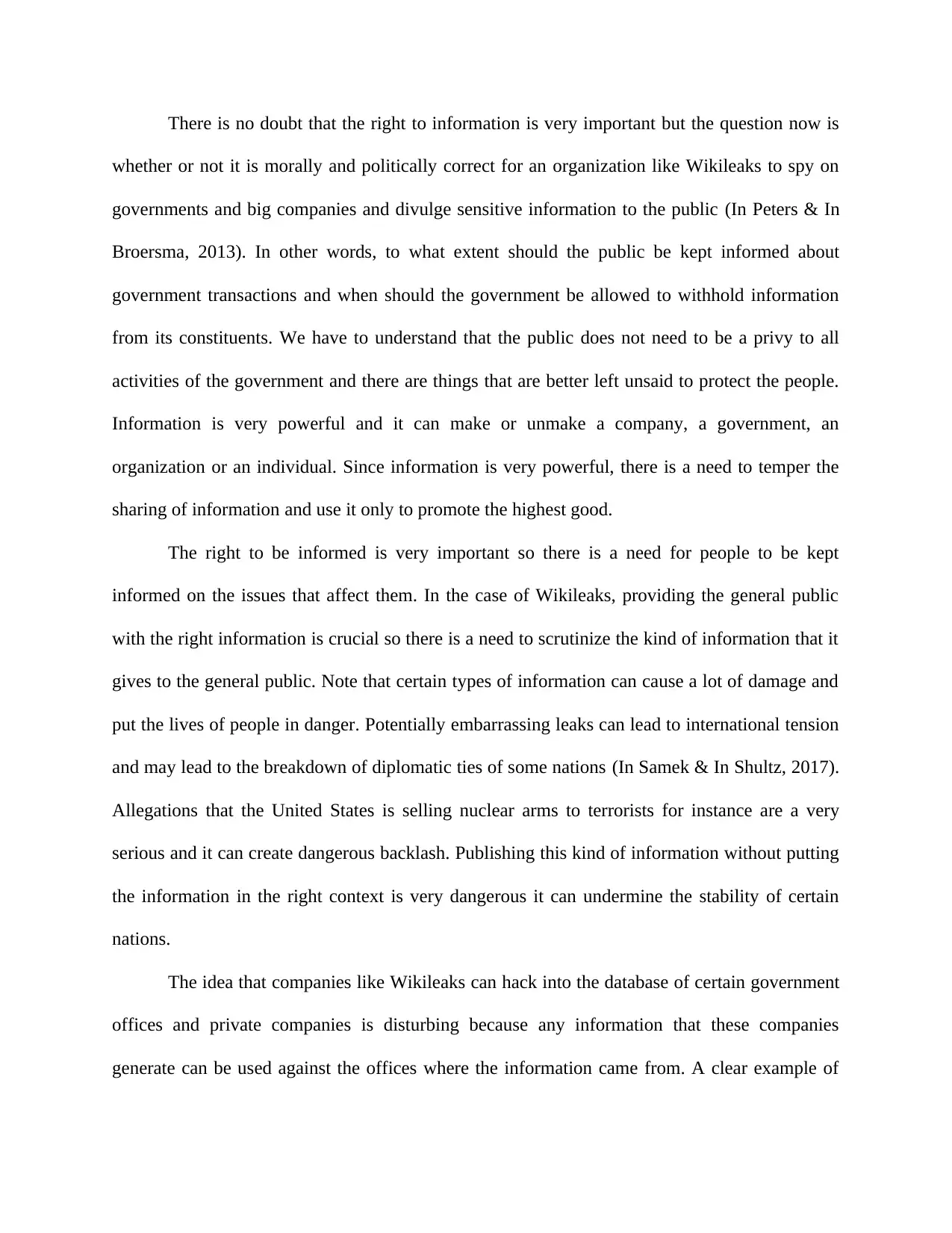
There is no doubt that the right to information is very important but the question now is
whether or not it is morally and politically correct for an organization like Wikileaks to spy on
governments and big companies and divulge sensitive information to the public (In Peters & In
Broersma, 2013). In other words, to what extent should the public be kept informed about
government transactions and when should the government be allowed to withhold information
from its constituents. We have to understand that the public does not need to be a privy to all
activities of the government and there are things that are better left unsaid to protect the people.
Information is very powerful and it can make or unmake a company, a government, an
organization or an individual. Since information is very powerful, there is a need to temper the
sharing of information and use it only to promote the highest good.
The right to be informed is very important so there is a need for people to be kept
informed on the issues that affect them. In the case of Wikileaks, providing the general public
with the right information is crucial so there is a need to scrutinize the kind of information that it
gives to the general public. Note that certain types of information can cause a lot of damage and
put the lives of people in danger. Potentially embarrassing leaks can lead to international tension
and may lead to the breakdown of diplomatic ties of some nations (In Samek & In Shultz, 2017).
Allegations that the United States is selling nuclear arms to terrorists for instance are a very
serious and it can create dangerous backlash. Publishing this kind of information without putting
the information in the right context is very dangerous it can undermine the stability of certain
nations.
The idea that companies like Wikileaks can hack into the database of certain government
offices and private companies is disturbing because any information that these companies
generate can be used against the offices where the information came from. A clear example of
whether or not it is morally and politically correct for an organization like Wikileaks to spy on
governments and big companies and divulge sensitive information to the public (In Peters & In
Broersma, 2013). In other words, to what extent should the public be kept informed about
government transactions and when should the government be allowed to withhold information
from its constituents. We have to understand that the public does not need to be a privy to all
activities of the government and there are things that are better left unsaid to protect the people.
Information is very powerful and it can make or unmake a company, a government, an
organization or an individual. Since information is very powerful, there is a need to temper the
sharing of information and use it only to promote the highest good.
The right to be informed is very important so there is a need for people to be kept
informed on the issues that affect them. In the case of Wikileaks, providing the general public
with the right information is crucial so there is a need to scrutinize the kind of information that it
gives to the general public. Note that certain types of information can cause a lot of damage and
put the lives of people in danger. Potentially embarrassing leaks can lead to international tension
and may lead to the breakdown of diplomatic ties of some nations (In Samek & In Shultz, 2017).
Allegations that the United States is selling nuclear arms to terrorists for instance are a very
serious and it can create dangerous backlash. Publishing this kind of information without putting
the information in the right context is very dangerous it can undermine the stability of certain
nations.
The idea that companies like Wikileaks can hack into the database of certain government
offices and private companies is disturbing because any information that these companies
generate can be used against the offices where the information came from. A clear example of
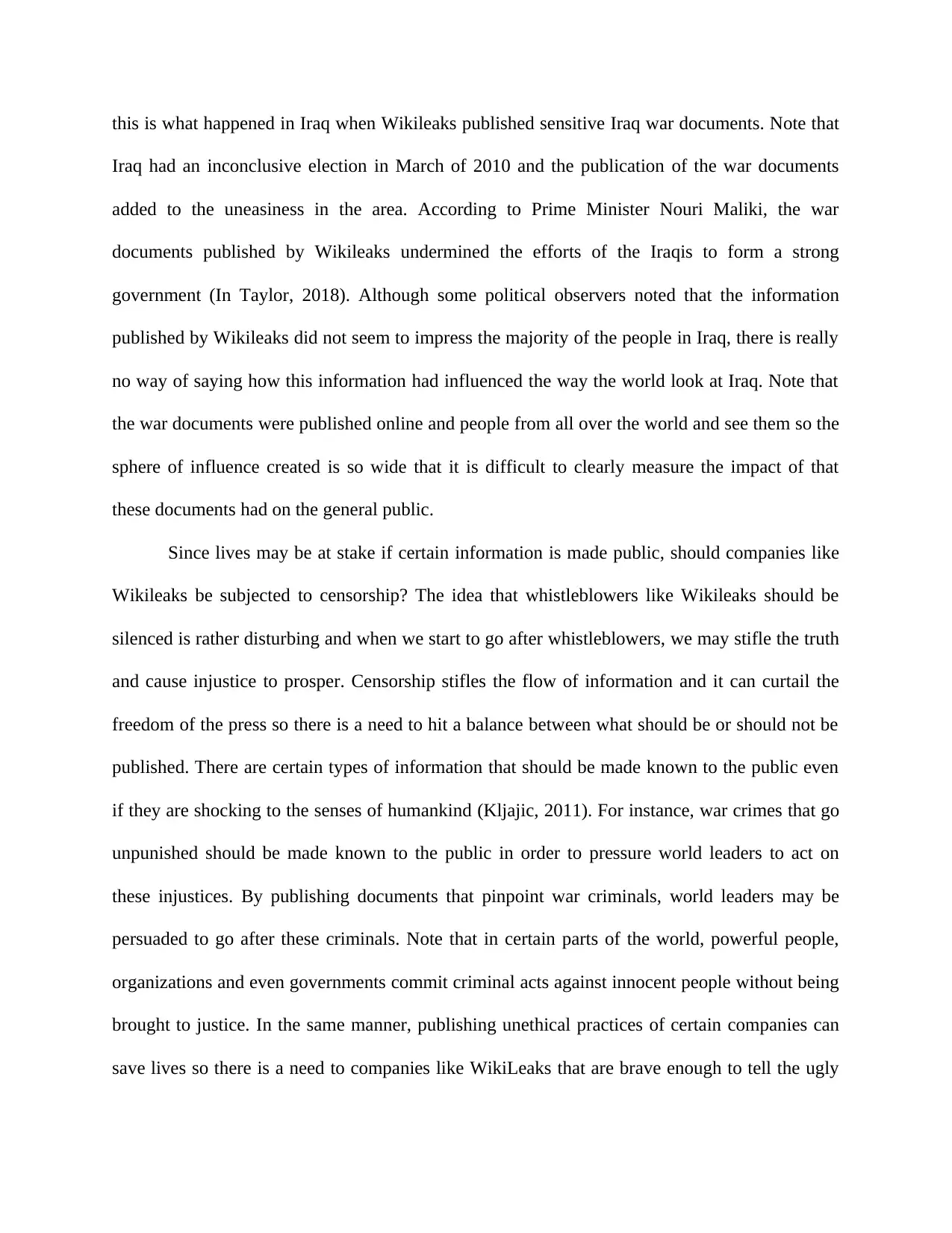
this is what happened in Iraq when Wikileaks published sensitive Iraq war documents. Note that
Iraq had an inconclusive election in March of 2010 and the publication of the war documents
added to the uneasiness in the area. According to Prime Minister Nouri Maliki, the war
documents published by Wikileaks undermined the efforts of the Iraqis to form a strong
government (In Taylor, 2018). Although some political observers noted that the information
published by Wikileaks did not seem to impress the majority of the people in Iraq, there is really
no way of saying how this information had influenced the way the world look at Iraq. Note that
the war documents were published online and people from all over the world and see them so the
sphere of influence created is so wide that it is difficult to clearly measure the impact of that
these documents had on the general public.
Since lives may be at stake if certain information is made public, should companies like
Wikileaks be subjected to censorship? The idea that whistleblowers like Wikileaks should be
silenced is rather disturbing and when we start to go after whistleblowers, we may stifle the truth
and cause injustice to prosper. Censorship stifles the flow of information and it can curtail the
freedom of the press so there is a need to hit a balance between what should be or should not be
published. There are certain types of information that should be made known to the public even
if they are shocking to the senses of humankind (Kljajic, 2011). For instance, war crimes that go
unpunished should be made known to the public in order to pressure world leaders to act on
these injustices. By publishing documents that pinpoint war criminals, world leaders may be
persuaded to go after these criminals. Note that in certain parts of the world, powerful people,
organizations and even governments commit criminal acts against innocent people without being
brought to justice. In the same manner, publishing unethical practices of certain companies can
save lives so there is a need to companies like WikiLeaks that are brave enough to tell the ugly
Iraq had an inconclusive election in March of 2010 and the publication of the war documents
added to the uneasiness in the area. According to Prime Minister Nouri Maliki, the war
documents published by Wikileaks undermined the efforts of the Iraqis to form a strong
government (In Taylor, 2018). Although some political observers noted that the information
published by Wikileaks did not seem to impress the majority of the people in Iraq, there is really
no way of saying how this information had influenced the way the world look at Iraq. Note that
the war documents were published online and people from all over the world and see them so the
sphere of influence created is so wide that it is difficult to clearly measure the impact of that
these documents had on the general public.
Since lives may be at stake if certain information is made public, should companies like
Wikileaks be subjected to censorship? The idea that whistleblowers like Wikileaks should be
silenced is rather disturbing and when we start to go after whistleblowers, we may stifle the truth
and cause injustice to prosper. Censorship stifles the flow of information and it can curtail the
freedom of the press so there is a need to hit a balance between what should be or should not be
published. There are certain types of information that should be made known to the public even
if they are shocking to the senses of humankind (Kljajic, 2011). For instance, war crimes that go
unpunished should be made known to the public in order to pressure world leaders to act on
these injustices. By publishing documents that pinpoint war criminals, world leaders may be
persuaded to go after these criminals. Note that in certain parts of the world, powerful people,
organizations and even governments commit criminal acts against innocent people without being
brought to justice. In the same manner, publishing unethical practices of certain companies can
save lives so there is a need to companies like WikiLeaks that are brave enough to tell the ugly
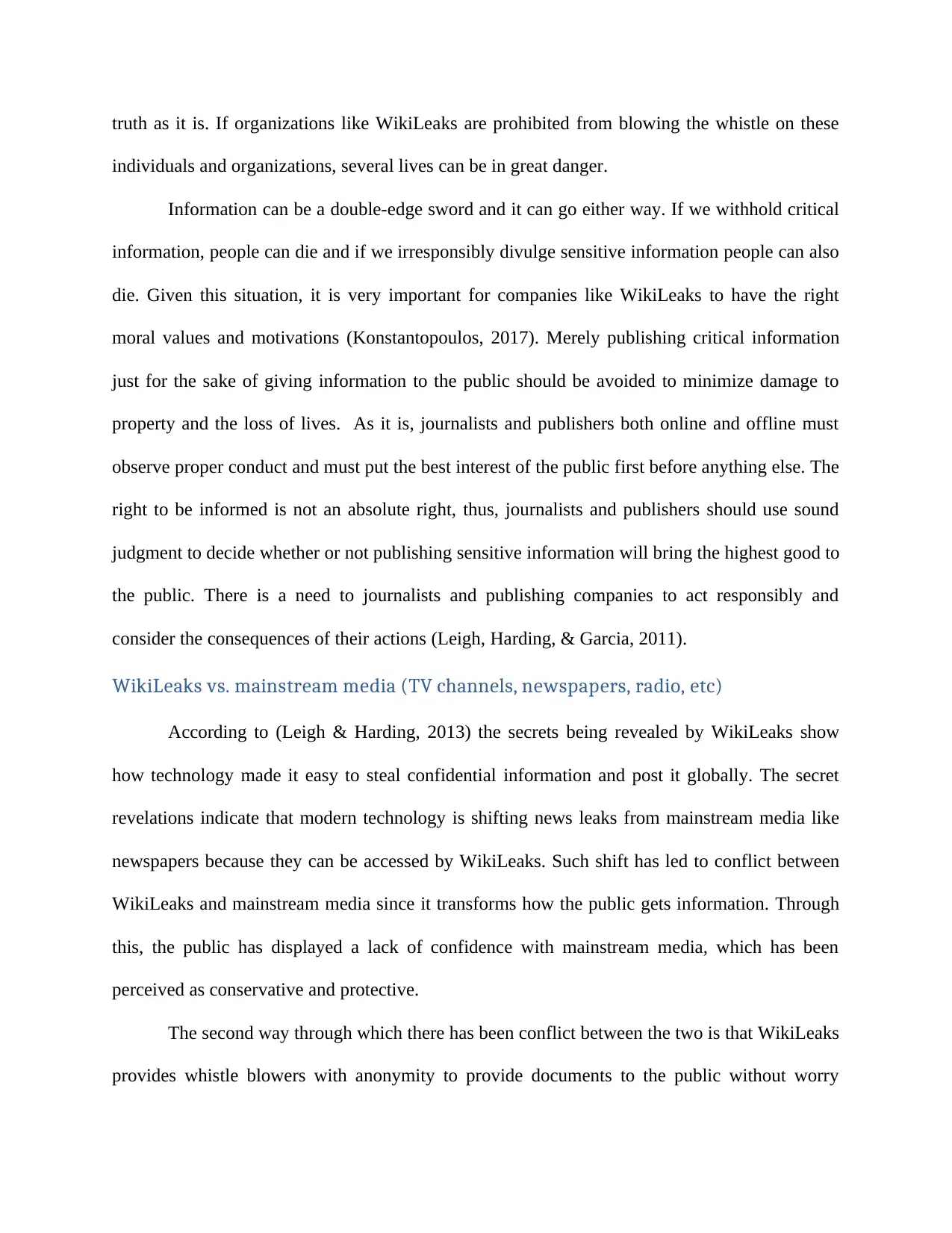
truth as it is. If organizations like WikiLeaks are prohibited from blowing the whistle on these
individuals and organizations, several lives can be in great danger.
Information can be a double-edge sword and it can go either way. If we withhold critical
information, people can die and if we irresponsibly divulge sensitive information people can also
die. Given this situation, it is very important for companies like WikiLeaks to have the right
moral values and motivations (Konstantopoulos, 2017). Merely publishing critical information
just for the sake of giving information to the public should be avoided to minimize damage to
property and the loss of lives. As it is, journalists and publishers both online and offline must
observe proper conduct and must put the best interest of the public first before anything else. The
right to be informed is not an absolute right, thus, journalists and publishers should use sound
judgment to decide whether or not publishing sensitive information will bring the highest good to
the public. There is a need to journalists and publishing companies to act responsibly and
consider the consequences of their actions (Leigh, Harding, & Garcia, 2011).
WikiLeaks vs. mainstream media (TV channels, newspapers, radio, etc)
According to (Leigh & Harding, 2013) the secrets being revealed by WikiLeaks show
how technology made it easy to steal confidential information and post it globally. The secret
revelations indicate that modern technology is shifting news leaks from mainstream media like
newspapers because they can be accessed by WikiLeaks. Such shift has led to conflict between
WikiLeaks and mainstream media since it transforms how the public gets information. Through
this, the public has displayed a lack of confidence with mainstream media, which has been
perceived as conservative and protective.
The second way through which there has been conflict between the two is that WikiLeaks
provides whistle blowers with anonymity to provide documents to the public without worry
individuals and organizations, several lives can be in great danger.
Information can be a double-edge sword and it can go either way. If we withhold critical
information, people can die and if we irresponsibly divulge sensitive information people can also
die. Given this situation, it is very important for companies like WikiLeaks to have the right
moral values and motivations (Konstantopoulos, 2017). Merely publishing critical information
just for the sake of giving information to the public should be avoided to minimize damage to
property and the loss of lives. As it is, journalists and publishers both online and offline must
observe proper conduct and must put the best interest of the public first before anything else. The
right to be informed is not an absolute right, thus, journalists and publishers should use sound
judgment to decide whether or not publishing sensitive information will bring the highest good to
the public. There is a need to journalists and publishing companies to act responsibly and
consider the consequences of their actions (Leigh, Harding, & Garcia, 2011).
WikiLeaks vs. mainstream media (TV channels, newspapers, radio, etc)
According to (Leigh & Harding, 2013) the secrets being revealed by WikiLeaks show
how technology made it easy to steal confidential information and post it globally. The secret
revelations indicate that modern technology is shifting news leaks from mainstream media like
newspapers because they can be accessed by WikiLeaks. Such shift has led to conflict between
WikiLeaks and mainstream media since it transforms how the public gets information. Through
this, the public has displayed a lack of confidence with mainstream media, which has been
perceived as conservative and protective.
The second way through which there has been conflict between the two is that WikiLeaks
provides whistle blowers with anonymity to provide documents to the public without worry
Paraphrase This Document
Need a fresh take? Get an instant paraphrase of this document with our AI Paraphraser
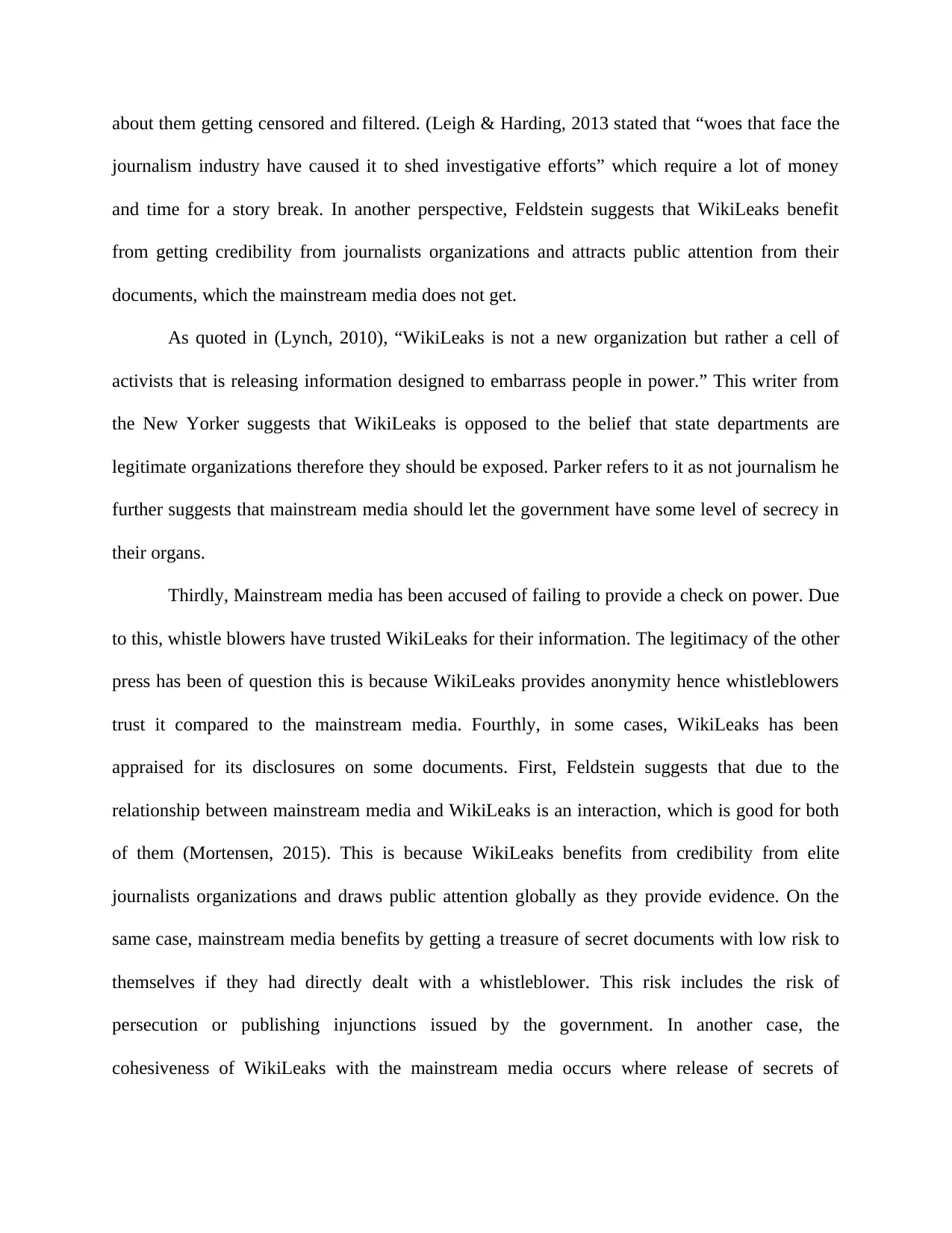
about them getting censored and filtered. (Leigh & Harding, 2013 stated that “woes that face the
journalism industry have caused it to shed investigative efforts” which require a lot of money
and time for a story break. In another perspective, Feldstein suggests that WikiLeaks benefit
from getting credibility from journalists organizations and attracts public attention from their
documents, which the mainstream media does not get.
As quoted in (Lynch, 2010), “WikiLeaks is not a new organization but rather a cell of
activists that is releasing information designed to embarrass people in power.” This writer from
the New Yorker suggests that WikiLeaks is opposed to the belief that state departments are
legitimate organizations therefore they should be exposed. Parker refers to it as not journalism he
further suggests that mainstream media should let the government have some level of secrecy in
their organs.
Thirdly, Mainstream media has been accused of failing to provide a check on power. Due
to this, whistle blowers have trusted WikiLeaks for their information. The legitimacy of the other
press has been of question this is because WikiLeaks provides anonymity hence whistleblowers
trust it compared to the mainstream media. Fourthly, in some cases, WikiLeaks has been
appraised for its disclosures on some documents. First, Feldstein suggests that due to the
relationship between mainstream media and WikiLeaks is an interaction, which is good for both
of them (Mortensen, 2015). This is because WikiLeaks benefits from credibility from elite
journalists organizations and draws public attention globally as they provide evidence. On the
same case, mainstream media benefits by getting a treasure of secret documents with low risk to
themselves if they had directly dealt with a whistleblower. This risk includes the risk of
persecution or publishing injunctions issued by the government. In another case, the
cohesiveness of WikiLeaks with the mainstream media occurs where release of secrets of
journalism industry have caused it to shed investigative efforts” which require a lot of money
and time for a story break. In another perspective, Feldstein suggests that WikiLeaks benefit
from getting credibility from journalists organizations and attracts public attention from their
documents, which the mainstream media does not get.
As quoted in (Lynch, 2010), “WikiLeaks is not a new organization but rather a cell of
activists that is releasing information designed to embarrass people in power.” This writer from
the New Yorker suggests that WikiLeaks is opposed to the belief that state departments are
legitimate organizations therefore they should be exposed. Parker refers to it as not journalism he
further suggests that mainstream media should let the government have some level of secrecy in
their organs.
Thirdly, Mainstream media has been accused of failing to provide a check on power. Due
to this, whistle blowers have trusted WikiLeaks for their information. The legitimacy of the other
press has been of question this is because WikiLeaks provides anonymity hence whistleblowers
trust it compared to the mainstream media. Fourthly, in some cases, WikiLeaks has been
appraised for its disclosures on some documents. First, Feldstein suggests that due to the
relationship between mainstream media and WikiLeaks is an interaction, which is good for both
of them (Mortensen, 2015). This is because WikiLeaks benefits from credibility from elite
journalists organizations and draws public attention globally as they provide evidence. On the
same case, mainstream media benefits by getting a treasure of secret documents with low risk to
themselves if they had directly dealt with a whistleblower. This risk includes the risk of
persecution or publishing injunctions issued by the government. In another case, the
cohesiveness of WikiLeaks with the mainstream media occurs where release of secrets of
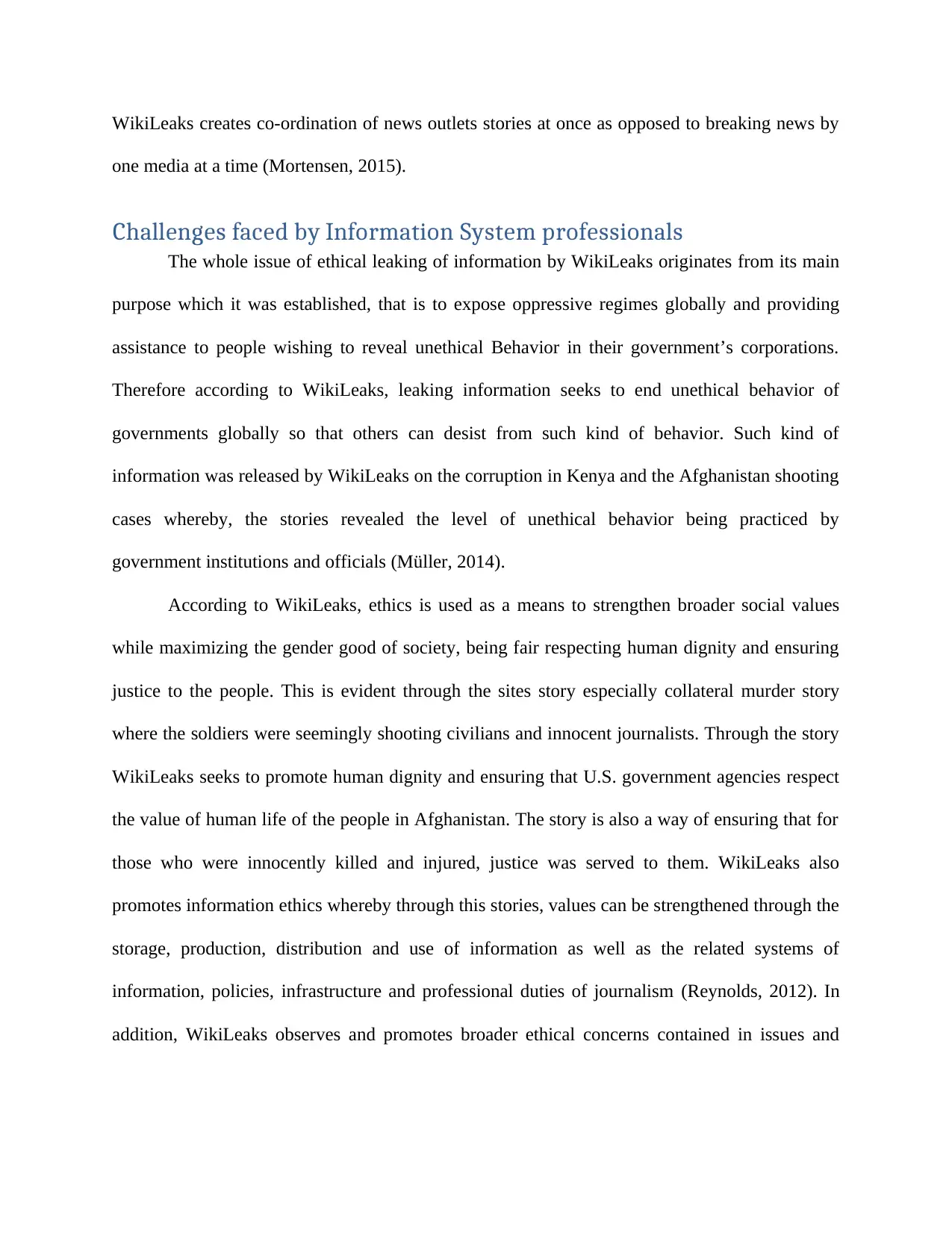
WikiLeaks creates co-ordination of news outlets stories at once as opposed to breaking news by
one media at a time (Mortensen, 2015).
Challenges faced by Information System professionals
The whole issue of ethical leaking of information by WikiLeaks originates from its main
purpose which it was established, that is to expose oppressive regimes globally and providing
assistance to people wishing to reveal unethical Behavior in their government’s corporations.
Therefore according to WikiLeaks, leaking information seeks to end unethical behavior of
governments globally so that others can desist from such kind of behavior. Such kind of
information was released by WikiLeaks on the corruption in Kenya and the Afghanistan shooting
cases whereby, the stories revealed the level of unethical behavior being practiced by
government institutions and officials (Müller, 2014).
According to WikiLeaks, ethics is used as a means to strengthen broader social values
while maximizing the gender good of society, being fair respecting human dignity and ensuring
justice to the people. This is evident through the sites story especially collateral murder story
where the soldiers were seemingly shooting civilians and innocent journalists. Through the story
WikiLeaks seeks to promote human dignity and ensuring that U.S. government agencies respect
the value of human life of the people in Afghanistan. The story is also a way of ensuring that for
those who were innocently killed and injured, justice was served to them. WikiLeaks also
promotes information ethics whereby through this stories, values can be strengthened through the
storage, production, distribution and use of information as well as the related systems of
information, policies, infrastructure and professional duties of journalism (Reynolds, 2012). In
addition, WikiLeaks observes and promotes broader ethical concerns contained in issues and
one media at a time (Mortensen, 2015).
Challenges faced by Information System professionals
The whole issue of ethical leaking of information by WikiLeaks originates from its main
purpose which it was established, that is to expose oppressive regimes globally and providing
assistance to people wishing to reveal unethical Behavior in their government’s corporations.
Therefore according to WikiLeaks, leaking information seeks to end unethical behavior of
governments globally so that others can desist from such kind of behavior. Such kind of
information was released by WikiLeaks on the corruption in Kenya and the Afghanistan shooting
cases whereby, the stories revealed the level of unethical behavior being practiced by
government institutions and officials (Müller, 2014).
According to WikiLeaks, ethics is used as a means to strengthen broader social values
while maximizing the gender good of society, being fair respecting human dignity and ensuring
justice to the people. This is evident through the sites story especially collateral murder story
where the soldiers were seemingly shooting civilians and innocent journalists. Through the story
WikiLeaks seeks to promote human dignity and ensuring that U.S. government agencies respect
the value of human life of the people in Afghanistan. The story is also a way of ensuring that for
those who were innocently killed and injured, justice was served to them. WikiLeaks also
promotes information ethics whereby through this stories, values can be strengthened through the
storage, production, distribution and use of information as well as the related systems of
information, policies, infrastructure and professional duties of journalism (Reynolds, 2012). In
addition, WikiLeaks observes and promotes broader ethical concerns contained in issues and
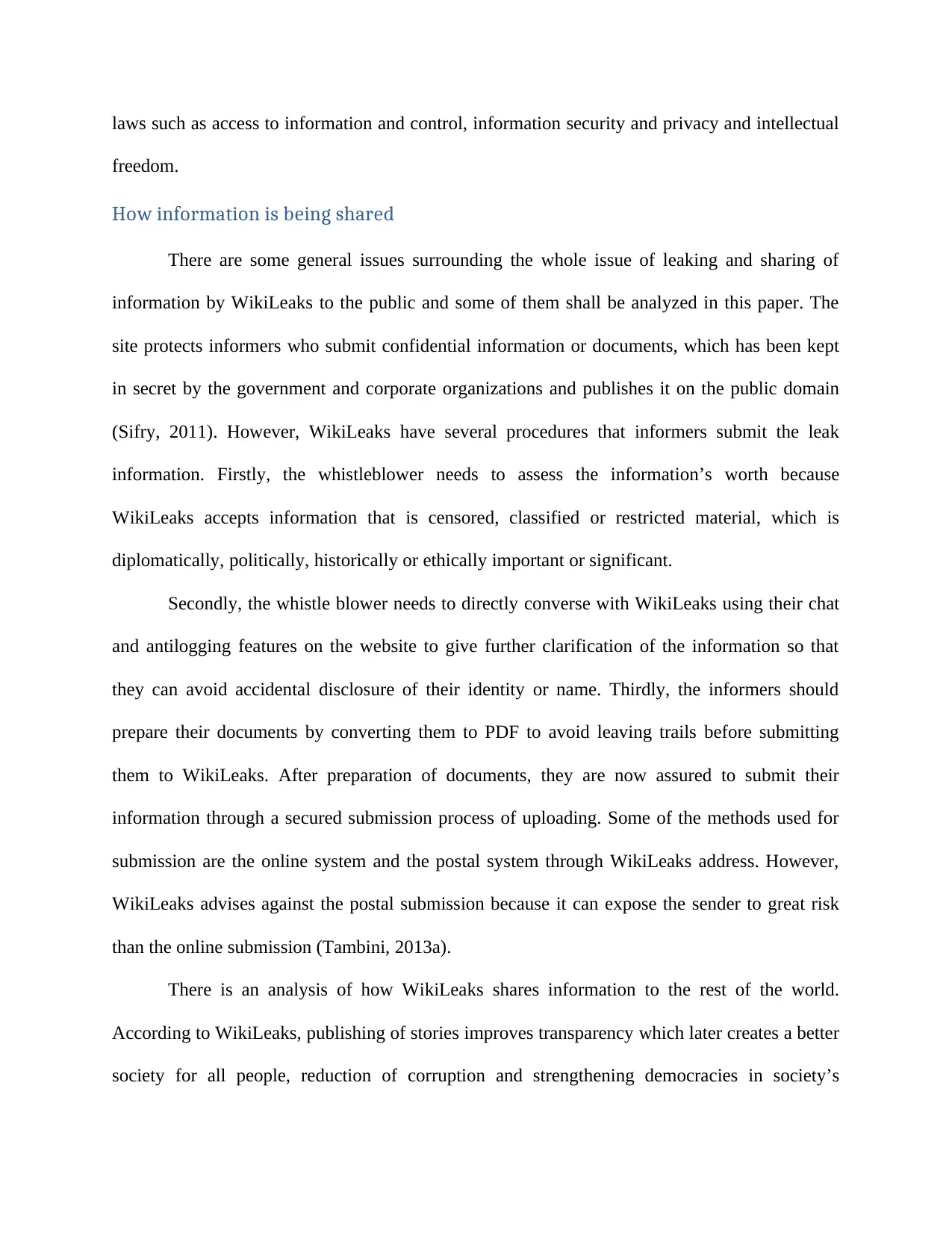
laws such as access to information and control, information security and privacy and intellectual
freedom.
How information is being shared
There are some general issues surrounding the whole issue of leaking and sharing of
information by WikiLeaks to the public and some of them shall be analyzed in this paper. The
site protects informers who submit confidential information or documents, which has been kept
in secret by the government and corporate organizations and publishes it on the public domain
(Sifry, 2011). However, WikiLeaks have several procedures that informers submit the leak
information. Firstly, the whistleblower needs to assess the information’s worth because
WikiLeaks accepts information that is censored, classified or restricted material, which is
diplomatically, politically, historically or ethically important or significant.
Secondly, the whistle blower needs to directly converse with WikiLeaks using their chat
and antilogging features on the website to give further clarification of the information so that
they can avoid accidental disclosure of their identity or name. Thirdly, the informers should
prepare their documents by converting them to PDF to avoid leaving trails before submitting
them to WikiLeaks. After preparation of documents, they are now assured to submit their
information through a secured submission process of uploading. Some of the methods used for
submission are the online system and the postal system through WikiLeaks address. However,
WikiLeaks advises against the postal submission because it can expose the sender to great risk
than the online submission (Tambini, 2013a).
There is an analysis of how WikiLeaks shares information to the rest of the world.
According to WikiLeaks, publishing of stories improves transparency which later creates a better
society for all people, reduction of corruption and strengthening democracies in society’s
freedom.
How information is being shared
There are some general issues surrounding the whole issue of leaking and sharing of
information by WikiLeaks to the public and some of them shall be analyzed in this paper. The
site protects informers who submit confidential information or documents, which has been kept
in secret by the government and corporate organizations and publishes it on the public domain
(Sifry, 2011). However, WikiLeaks have several procedures that informers submit the leak
information. Firstly, the whistleblower needs to assess the information’s worth because
WikiLeaks accepts information that is censored, classified or restricted material, which is
diplomatically, politically, historically or ethically important or significant.
Secondly, the whistle blower needs to directly converse with WikiLeaks using their chat
and antilogging features on the website to give further clarification of the information so that
they can avoid accidental disclosure of their identity or name. Thirdly, the informers should
prepare their documents by converting them to PDF to avoid leaving trails before submitting
them to WikiLeaks. After preparation of documents, they are now assured to submit their
information through a secured submission process of uploading. Some of the methods used for
submission are the online system and the postal system through WikiLeaks address. However,
WikiLeaks advises against the postal submission because it can expose the sender to great risk
than the online submission (Tambini, 2013a).
There is an analysis of how WikiLeaks shares information to the rest of the world.
According to WikiLeaks, publishing of stories improves transparency which later creates a better
society for all people, reduction of corruption and strengthening democracies in society’s
Secure Best Marks with AI Grader
Need help grading? Try our AI Grader for instant feedback on your assignments.
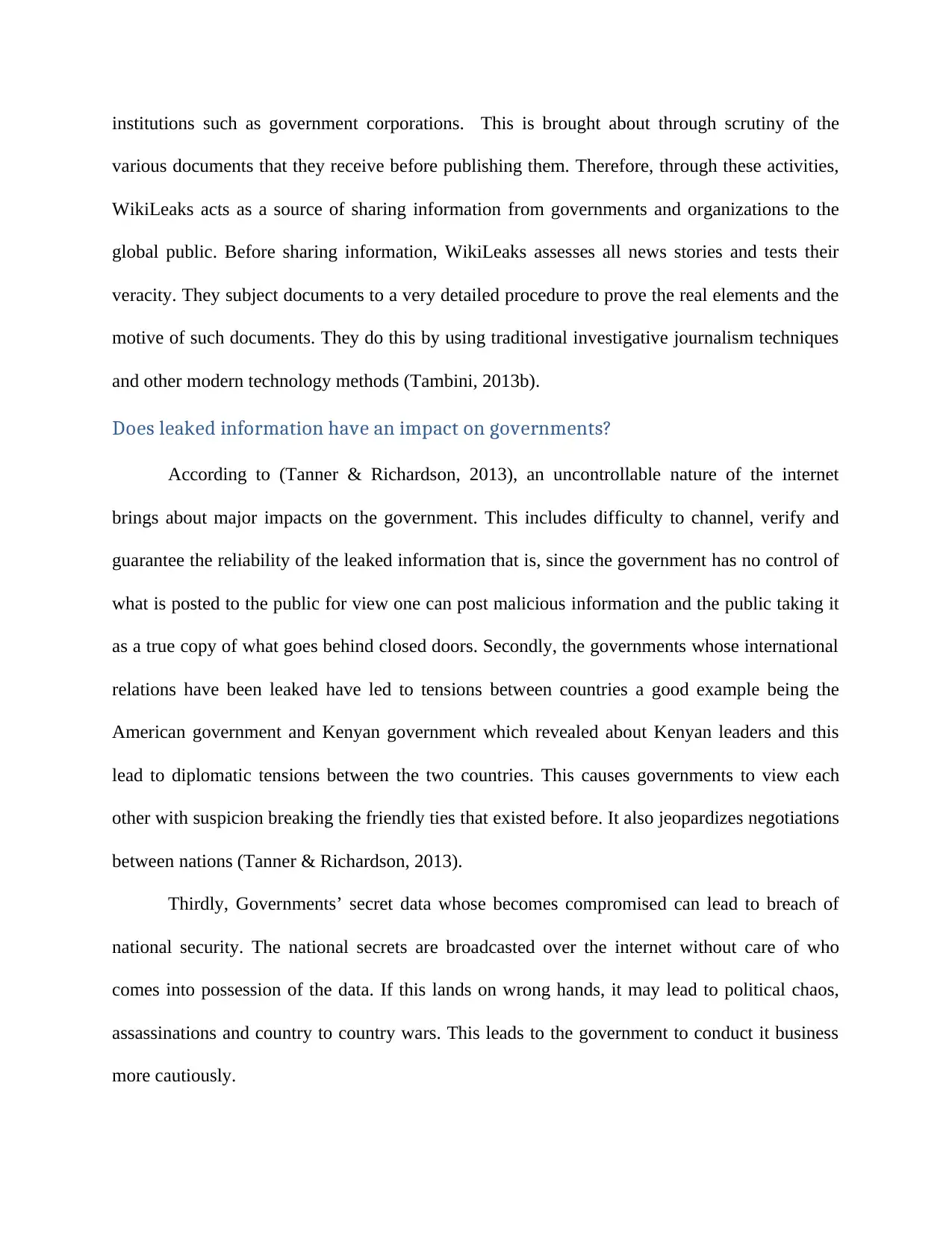
institutions such as government corporations. This is brought about through scrutiny of the
various documents that they receive before publishing them. Therefore, through these activities,
WikiLeaks acts as a source of sharing information from governments and organizations to the
global public. Before sharing information, WikiLeaks assesses all news stories and tests their
veracity. They subject documents to a very detailed procedure to prove the real elements and the
motive of such documents. They do this by using traditional investigative journalism techniques
and other modern technology methods (Tambini, 2013b).
Does leaked information have an impact on governments?
According to (Tanner & Richardson, 2013), an uncontrollable nature of the internet
brings about major impacts on the government. This includes difficulty to channel, verify and
guarantee the reliability of the leaked information that is, since the government has no control of
what is posted to the public for view one can post malicious information and the public taking it
as a true copy of what goes behind closed doors. Secondly, the governments whose international
relations have been leaked have led to tensions between countries a good example being the
American government and Kenyan government which revealed about Kenyan leaders and this
lead to diplomatic tensions between the two countries. This causes governments to view each
other with suspicion breaking the friendly ties that existed before. It also jeopardizes negotiations
between nations (Tanner & Richardson, 2013).
Thirdly, Governments’ secret data whose becomes compromised can lead to breach of
national security. The national secrets are broadcasted over the internet without care of who
comes into possession of the data. If this lands on wrong hands, it may lead to political chaos,
assassinations and country to country wars. This leads to the government to conduct it business
more cautiously.
various documents that they receive before publishing them. Therefore, through these activities,
WikiLeaks acts as a source of sharing information from governments and organizations to the
global public. Before sharing information, WikiLeaks assesses all news stories and tests their
veracity. They subject documents to a very detailed procedure to prove the real elements and the
motive of such documents. They do this by using traditional investigative journalism techniques
and other modern technology methods (Tambini, 2013b).
Does leaked information have an impact on governments?
According to (Tanner & Richardson, 2013), an uncontrollable nature of the internet
brings about major impacts on the government. This includes difficulty to channel, verify and
guarantee the reliability of the leaked information that is, since the government has no control of
what is posted to the public for view one can post malicious information and the public taking it
as a true copy of what goes behind closed doors. Secondly, the governments whose international
relations have been leaked have led to tensions between countries a good example being the
American government and Kenyan government which revealed about Kenyan leaders and this
lead to diplomatic tensions between the two countries. This causes governments to view each
other with suspicion breaking the friendly ties that existed before. It also jeopardizes negotiations
between nations (Tanner & Richardson, 2013).
Thirdly, Governments’ secret data whose becomes compromised can lead to breach of
national security. The national secrets are broadcasted over the internet without care of who
comes into possession of the data. If this lands on wrong hands, it may lead to political chaos,
assassinations and country to country wars. This leads to the government to conduct it business
more cautiously.
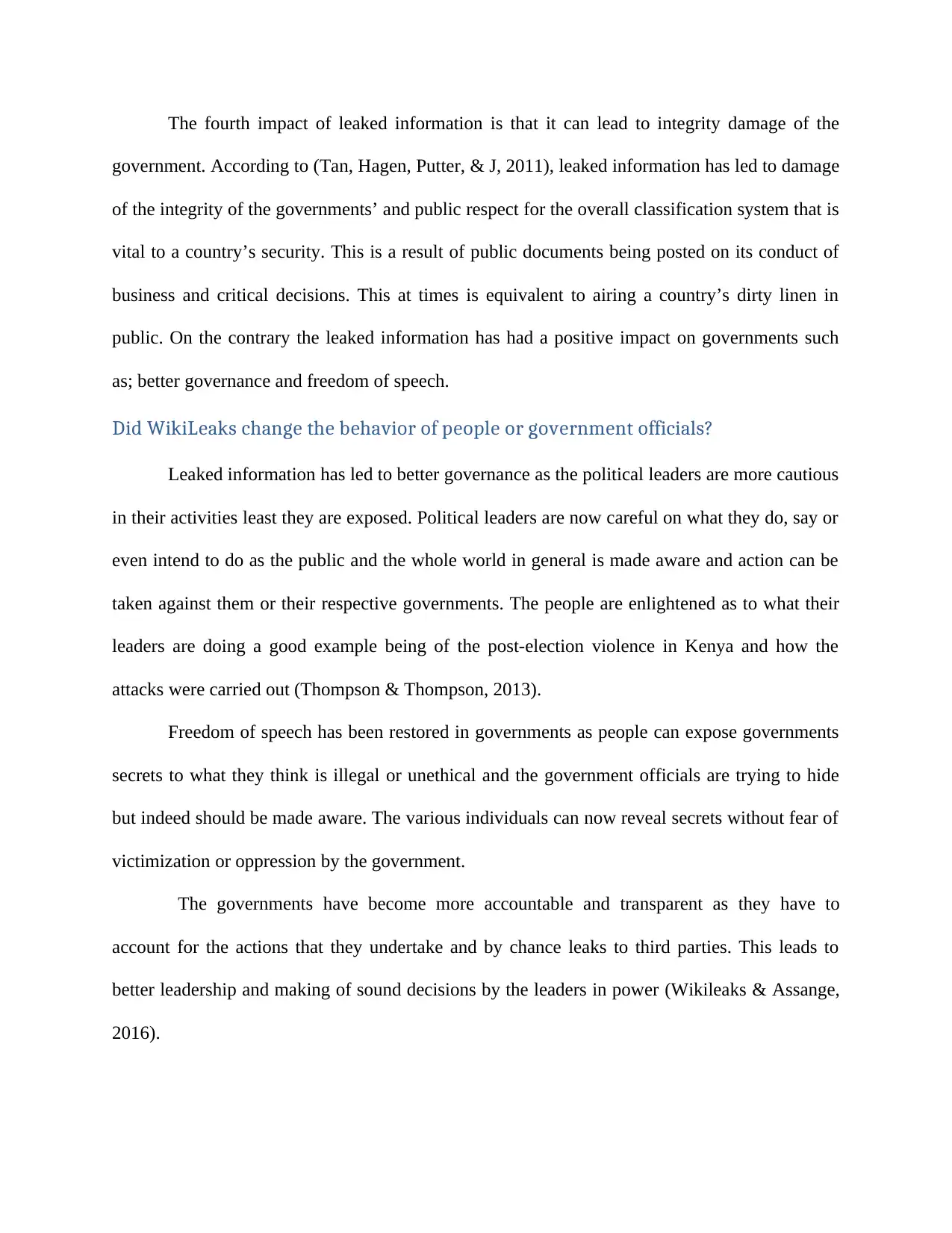
The fourth impact of leaked information is that it can lead to integrity damage of the
government. According to (Tan, Hagen, Putter, & J, 2011), leaked information has led to damage
of the integrity of the governments’ and public respect for the overall classification system that is
vital to a country’s security. This is a result of public documents being posted on its conduct of
business and critical decisions. This at times is equivalent to airing a country’s dirty linen in
public. On the contrary the leaked information has had a positive impact on governments such
as; better governance and freedom of speech.
Did WikiLeaks change the behavior of people or government officials?
Leaked information has led to better governance as the political leaders are more cautious
in their activities least they are exposed. Political leaders are now careful on what they do, say or
even intend to do as the public and the whole world in general is made aware and action can be
taken against them or their respective governments. The people are enlightened as to what their
leaders are doing a good example being of the post-election violence in Kenya and how the
attacks were carried out (Thompson & Thompson, 2013).
Freedom of speech has been restored in governments as people can expose governments
secrets to what they think is illegal or unethical and the government officials are trying to hide
but indeed should be made aware. The various individuals can now reveal secrets without fear of
victimization or oppression by the government.
The governments have become more accountable and transparent as they have to
account for the actions that they undertake and by chance leaks to third parties. This leads to
better leadership and making of sound decisions by the leaders in power (Wikileaks & Assange,
2016).
government. According to (Tan, Hagen, Putter, & J, 2011), leaked information has led to damage
of the integrity of the governments’ and public respect for the overall classification system that is
vital to a country’s security. This is a result of public documents being posted on its conduct of
business and critical decisions. This at times is equivalent to airing a country’s dirty linen in
public. On the contrary the leaked information has had a positive impact on governments such
as; better governance and freedom of speech.
Did WikiLeaks change the behavior of people or government officials?
Leaked information has led to better governance as the political leaders are more cautious
in their activities least they are exposed. Political leaders are now careful on what they do, say or
even intend to do as the public and the whole world in general is made aware and action can be
taken against them or their respective governments. The people are enlightened as to what their
leaders are doing a good example being of the post-election violence in Kenya and how the
attacks were carried out (Thompson & Thompson, 2013).
Freedom of speech has been restored in governments as people can expose governments
secrets to what they think is illegal or unethical and the government officials are trying to hide
but indeed should be made aware. The various individuals can now reveal secrets without fear of
victimization or oppression by the government.
The governments have become more accountable and transparent as they have to
account for the actions that they undertake and by chance leaks to third parties. This leads to
better leadership and making of sound decisions by the leaders in power (Wikileaks & Assange,
2016).
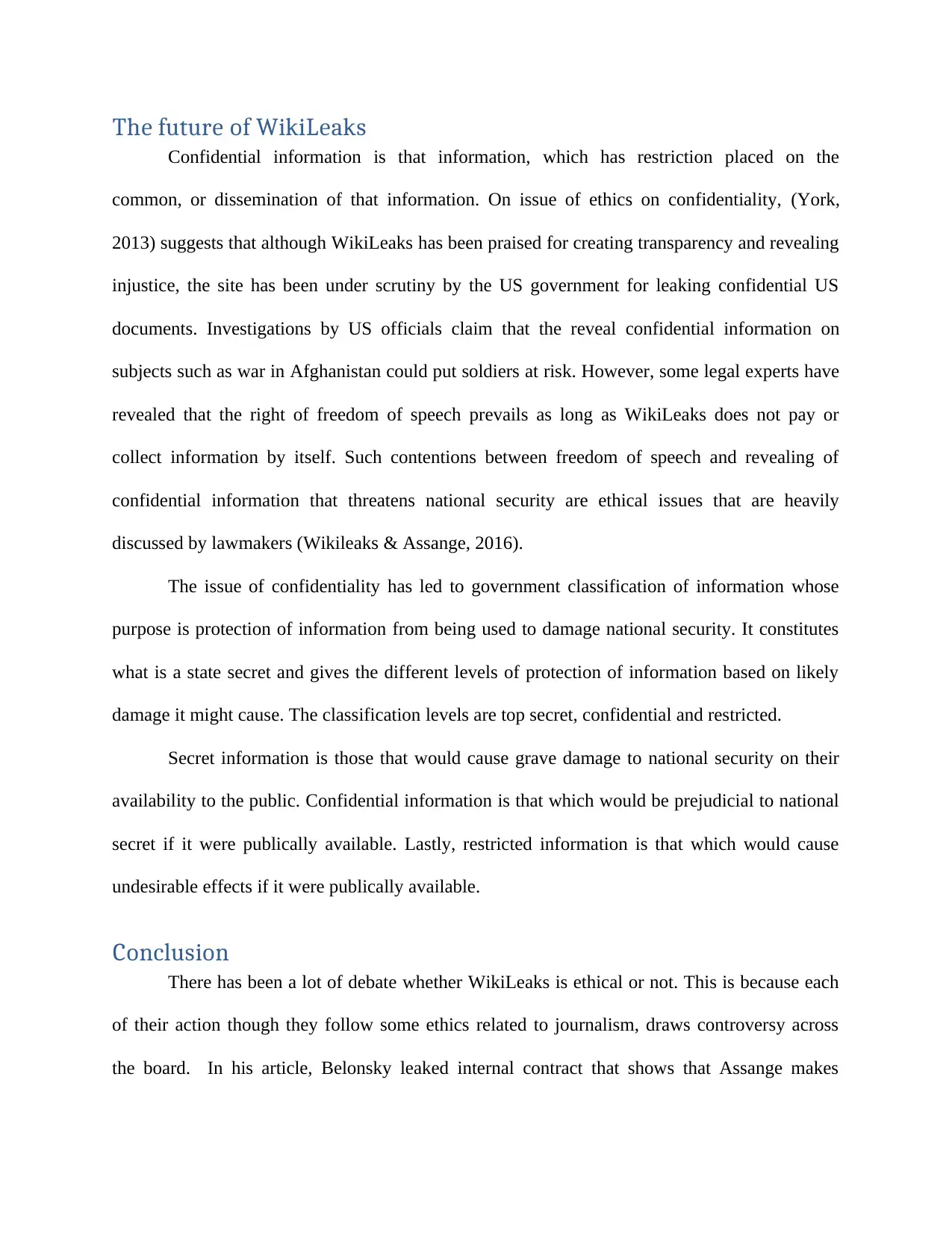
The future of WikiLeaks
Confidential information is that information, which has restriction placed on the
common, or dissemination of that information. On issue of ethics on confidentiality, (York,
2013) suggests that although WikiLeaks has been praised for creating transparency and revealing
injustice, the site has been under scrutiny by the US government for leaking confidential US
documents. Investigations by US officials claim that the reveal confidential information on
subjects such as war in Afghanistan could put soldiers at risk. However, some legal experts have
revealed that the right of freedom of speech prevails as long as WikiLeaks does not pay or
collect information by itself. Such contentions between freedom of speech and revealing of
confidential information that threatens national security are ethical issues that are heavily
discussed by lawmakers (Wikileaks & Assange, 2016).
The issue of confidentiality has led to government classification of information whose
purpose is protection of information from being used to damage national security. It constitutes
what is a state secret and gives the different levels of protection of information based on likely
damage it might cause. The classification levels are top secret, confidential and restricted.
Secret information is those that would cause grave damage to national security on their
availability to the public. Confidential information is that which would be prejudicial to national
secret if it were publically available. Lastly, restricted information is that which would cause
undesirable effects if it were publically available.
Conclusion
There has been a lot of debate whether WikiLeaks is ethical or not. This is because each
of their action though they follow some ethics related to journalism, draws controversy across
the board. In his article, Belonsky leaked internal contract that shows that Assange makes
Confidential information is that information, which has restriction placed on the
common, or dissemination of that information. On issue of ethics on confidentiality, (York,
2013) suggests that although WikiLeaks has been praised for creating transparency and revealing
injustice, the site has been under scrutiny by the US government for leaking confidential US
documents. Investigations by US officials claim that the reveal confidential information on
subjects such as war in Afghanistan could put soldiers at risk. However, some legal experts have
revealed that the right of freedom of speech prevails as long as WikiLeaks does not pay or
collect information by itself. Such contentions between freedom of speech and revealing of
confidential information that threatens national security are ethical issues that are heavily
discussed by lawmakers (Wikileaks & Assange, 2016).
The issue of confidentiality has led to government classification of information whose
purpose is protection of information from being used to damage national security. It constitutes
what is a state secret and gives the different levels of protection of information based on likely
damage it might cause. The classification levels are top secret, confidential and restricted.
Secret information is those that would cause grave damage to national security on their
availability to the public. Confidential information is that which would be prejudicial to national
secret if it were publically available. Lastly, restricted information is that which would cause
undesirable effects if it were publically available.
Conclusion
There has been a lot of debate whether WikiLeaks is ethical or not. This is because each
of their action though they follow some ethics related to journalism, draws controversy across
the board. In his article, Belonsky leaked internal contract that shows that Assange makes
Paraphrase This Document
Need a fresh take? Get an instant paraphrase of this document with our AI Paraphraser
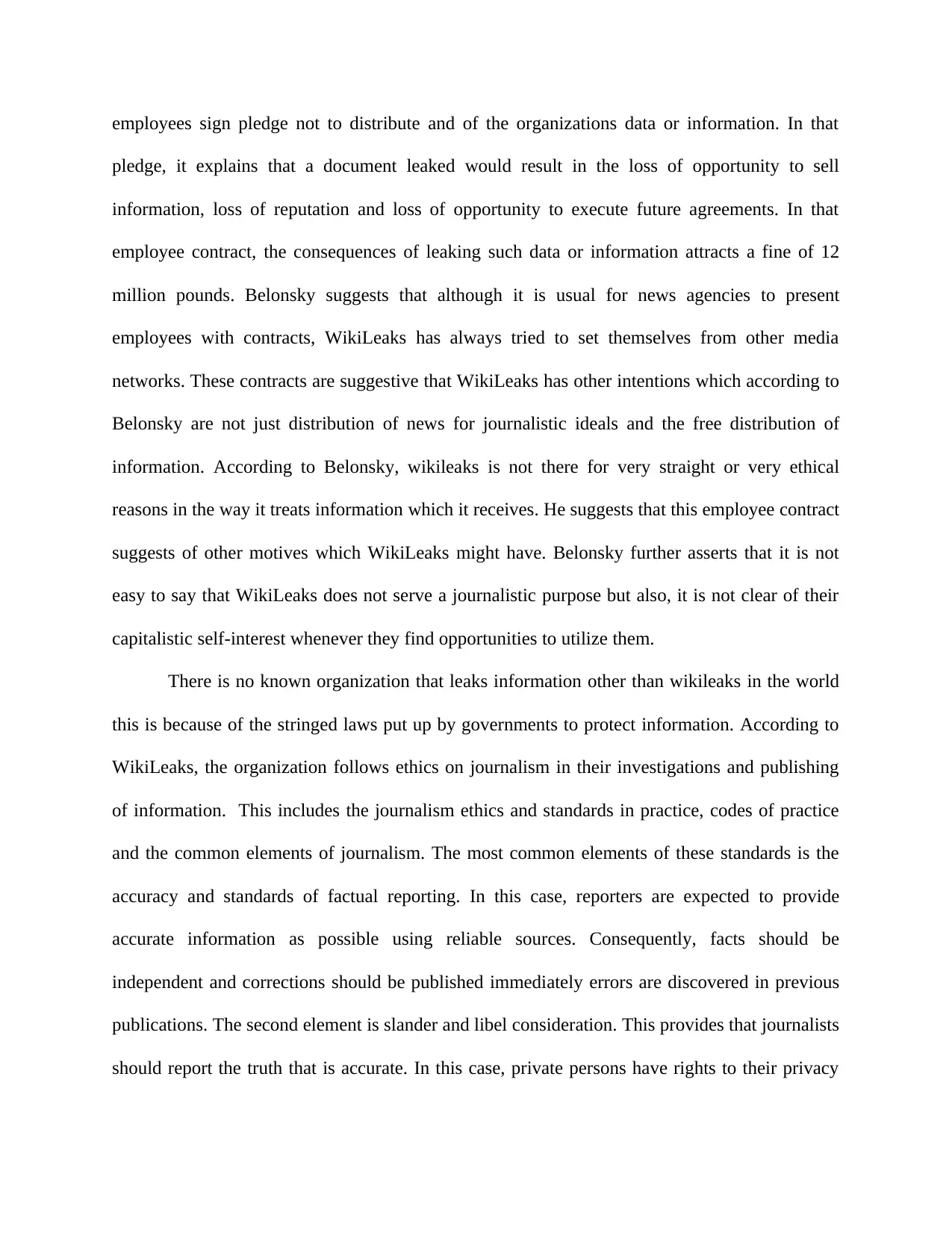
employees sign pledge not to distribute and of the organizations data or information. In that
pledge, it explains that a document leaked would result in the loss of opportunity to sell
information, loss of reputation and loss of opportunity to execute future agreements. In that
employee contract, the consequences of leaking such data or information attracts a fine of 12
million pounds. Belonsky suggests that although it is usual for news agencies to present
employees with contracts, WikiLeaks has always tried to set themselves from other media
networks. These contracts are suggestive that WikiLeaks has other intentions which according to
Belonsky are not just distribution of news for journalistic ideals and the free distribution of
information. According to Belonsky, wikileaks is not there for very straight or very ethical
reasons in the way it treats information which it receives. He suggests that this employee contract
suggests of other motives which WikiLeaks might have. Belonsky further asserts that it is not
easy to say that WikiLeaks does not serve a journalistic purpose but also, it is not clear of their
capitalistic self-interest whenever they find opportunities to utilize them.
There is no known organization that leaks information other than wikileaks in the world
this is because of the stringed laws put up by governments to protect information. According to
WikiLeaks, the organization follows ethics on journalism in their investigations and publishing
of information. This includes the journalism ethics and standards in practice, codes of practice
and the common elements of journalism. The most common elements of these standards is the
accuracy and standards of factual reporting. In this case, reporters are expected to provide
accurate information as possible using reliable sources. Consequently, facts should be
independent and corrections should be published immediately errors are discovered in previous
publications. The second element is slander and libel consideration. This provides that journalists
should report the truth that is accurate. In this case, private persons have rights to their privacy
pledge, it explains that a document leaked would result in the loss of opportunity to sell
information, loss of reputation and loss of opportunity to execute future agreements. In that
employee contract, the consequences of leaking such data or information attracts a fine of 12
million pounds. Belonsky suggests that although it is usual for news agencies to present
employees with contracts, WikiLeaks has always tried to set themselves from other media
networks. These contracts are suggestive that WikiLeaks has other intentions which according to
Belonsky are not just distribution of news for journalistic ideals and the free distribution of
information. According to Belonsky, wikileaks is not there for very straight or very ethical
reasons in the way it treats information which it receives. He suggests that this employee contract
suggests of other motives which WikiLeaks might have. Belonsky further asserts that it is not
easy to say that WikiLeaks does not serve a journalistic purpose but also, it is not clear of their
capitalistic self-interest whenever they find opportunities to utilize them.
There is no known organization that leaks information other than wikileaks in the world
this is because of the stringed laws put up by governments to protect information. According to
WikiLeaks, the organization follows ethics on journalism in their investigations and publishing
of information. This includes the journalism ethics and standards in practice, codes of practice
and the common elements of journalism. The most common elements of these standards is the
accuracy and standards of factual reporting. In this case, reporters are expected to provide
accurate information as possible using reliable sources. Consequently, facts should be
independent and corrections should be published immediately errors are discovered in previous
publications. The second element is slander and libel consideration. This provides that journalists
should report the truth that is accurate. In this case, private persons have rights to their privacy
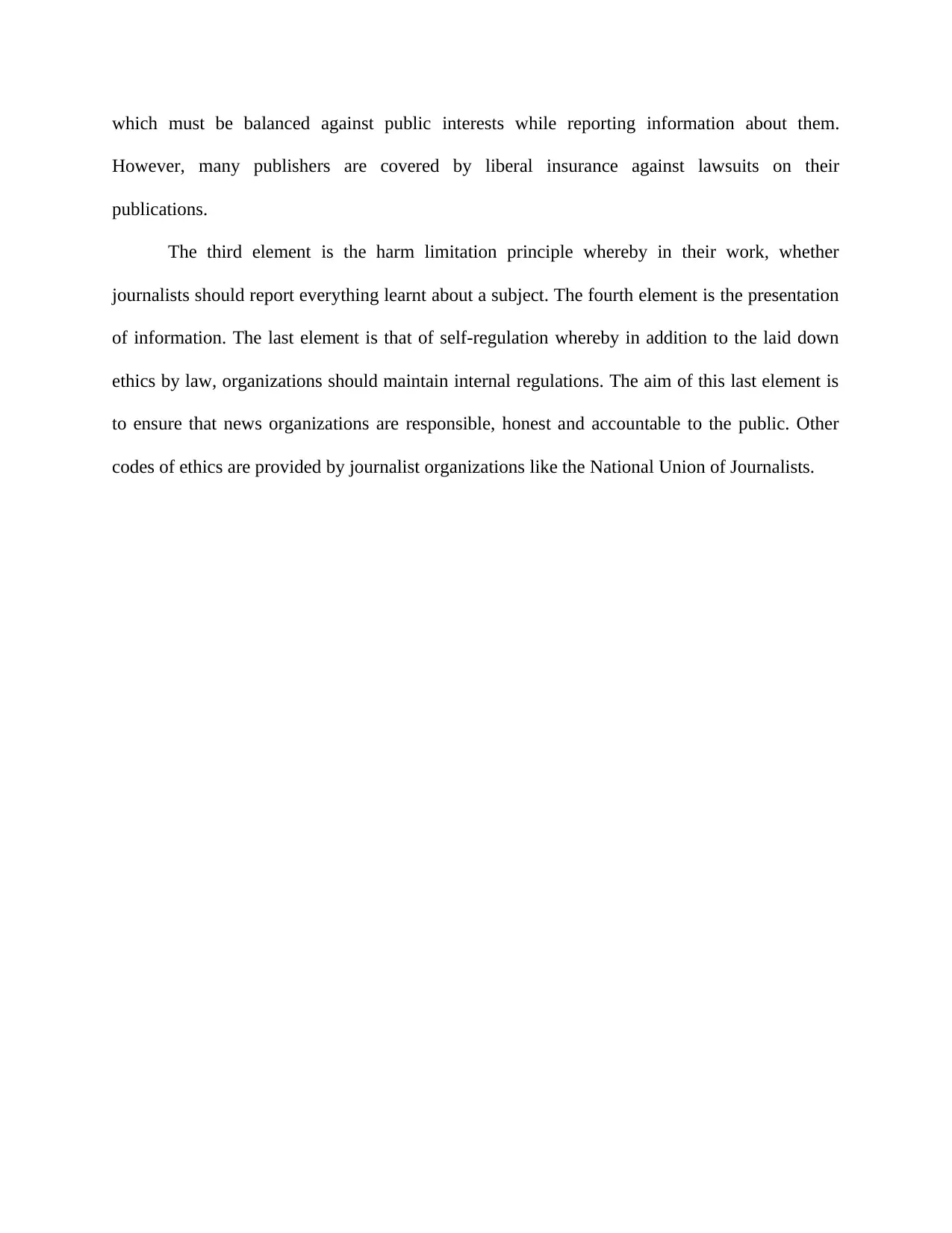
which must be balanced against public interests while reporting information about them.
However, many publishers are covered by liberal insurance against lawsuits on their
publications.
The third element is the harm limitation principle whereby in their work, whether
journalists should report everything learnt about a subject. The fourth element is the presentation
of information. The last element is that of self-regulation whereby in addition to the laid down
ethics by law, organizations should maintain internal regulations. The aim of this last element is
to ensure that news organizations are responsible, honest and accountable to the public. Other
codes of ethics are provided by journalist organizations like the National Union of Journalists.
However, many publishers are covered by liberal insurance against lawsuits on their
publications.
The third element is the harm limitation principle whereby in their work, whether
journalists should report everything learnt about a subject. The fourth element is the presentation
of information. The last element is that of self-regulation whereby in addition to the laid down
ethics by law, organizations should maintain internal regulations. The aim of this last element is
to ensure that news organizations are responsible, honest and accountable to the public. Other
codes of ethics are provided by journalist organizations like the National Union of Journalists.
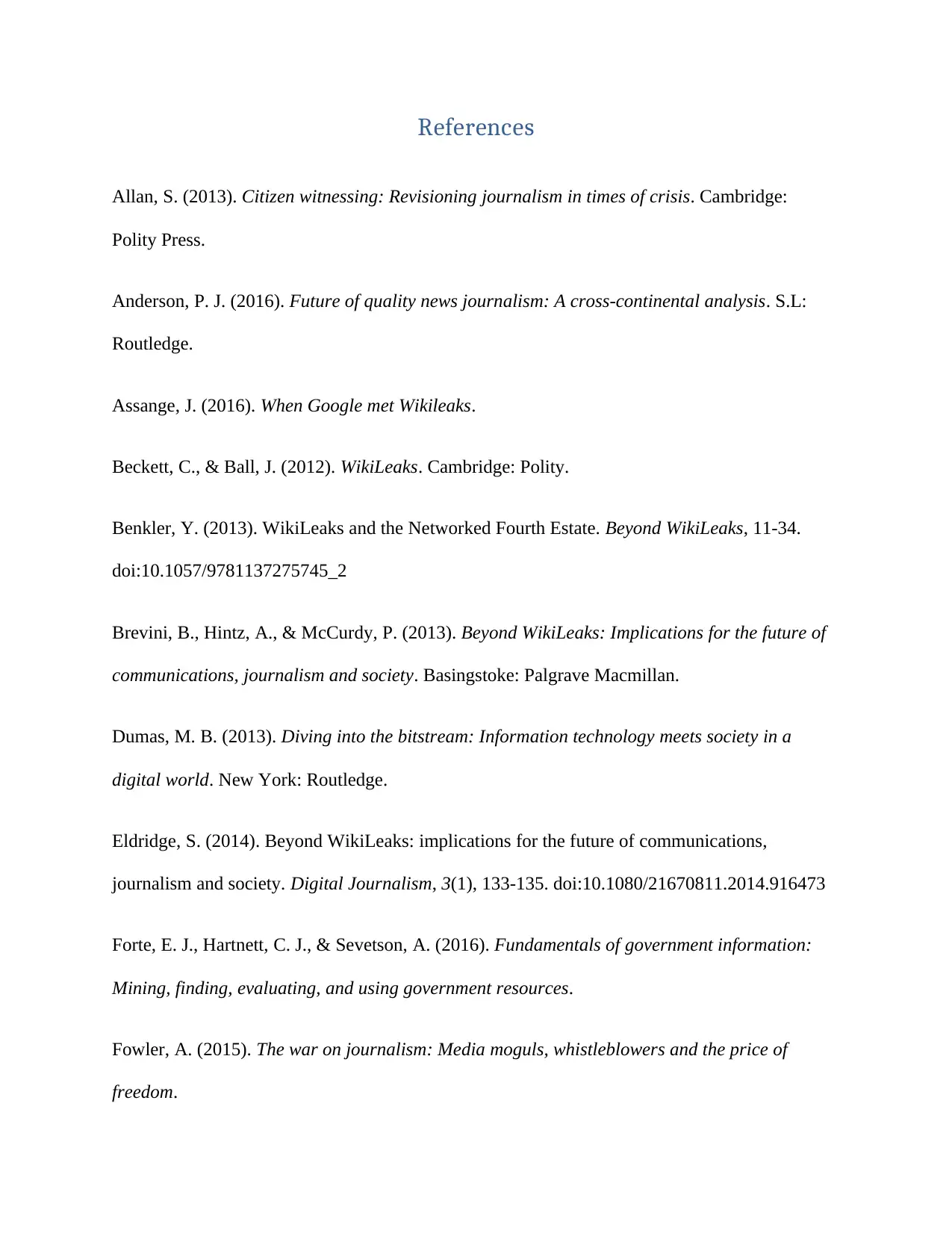
References
Allan, S. (2013). Citizen witnessing: Revisioning journalism in times of crisis. Cambridge:
Polity Press.
Anderson, P. J. (2016). Future of quality news journalism: A cross-continental analysis. S.L:
Routledge.
Assange, J. (2016). When Google met Wikileaks.
Beckett, C., & Ball, J. (2012). WikiLeaks. Cambridge: Polity.
Benkler, Y. (2013). WikiLeaks and the Networked Fourth Estate. Beyond WikiLeaks, 11-34.
doi:10.1057/9781137275745_2
Brevini, B., Hintz, A., & McCurdy, P. (2013). Beyond WikiLeaks: Implications for the future of
communications, journalism and society. Basingstoke: Palgrave Macmillan.
Dumas, M. B. (2013). Diving into the bitstream: Information technology meets society in a
digital world. New York: Routledge.
Eldridge, S. (2014). Beyond WikiLeaks: implications for the future of communications,
journalism and society. Digital Journalism, 3(1), 133-135. doi:10.1080/21670811.2014.916473
Forte, E. J., Hartnett, C. J., & Sevetson, A. (2016). Fundamentals of government information:
Mining, finding, evaluating, and using government resources.
Fowler, A. (2015). The war on journalism: Media moguls, whistleblowers and the price of
freedom.
Allan, S. (2013). Citizen witnessing: Revisioning journalism in times of crisis. Cambridge:
Polity Press.
Anderson, P. J. (2016). Future of quality news journalism: A cross-continental analysis. S.L:
Routledge.
Assange, J. (2016). When Google met Wikileaks.
Beckett, C., & Ball, J. (2012). WikiLeaks. Cambridge: Polity.
Benkler, Y. (2013). WikiLeaks and the Networked Fourth Estate. Beyond WikiLeaks, 11-34.
doi:10.1057/9781137275745_2
Brevini, B., Hintz, A., & McCurdy, P. (2013). Beyond WikiLeaks: Implications for the future of
communications, journalism and society. Basingstoke: Palgrave Macmillan.
Dumas, M. B. (2013). Diving into the bitstream: Information technology meets society in a
digital world. New York: Routledge.
Eldridge, S. (2014). Beyond WikiLeaks: implications for the future of communications,
journalism and society. Digital Journalism, 3(1), 133-135. doi:10.1080/21670811.2014.916473
Forte, E. J., Hartnett, C. J., & Sevetson, A. (2016). Fundamentals of government information:
Mining, finding, evaluating, and using government resources.
Fowler, A. (2015). The war on journalism: Media moguls, whistleblowers and the price of
freedom.
Secure Best Marks with AI Grader
Need help grading? Try our AI Grader for instant feedback on your assignments.
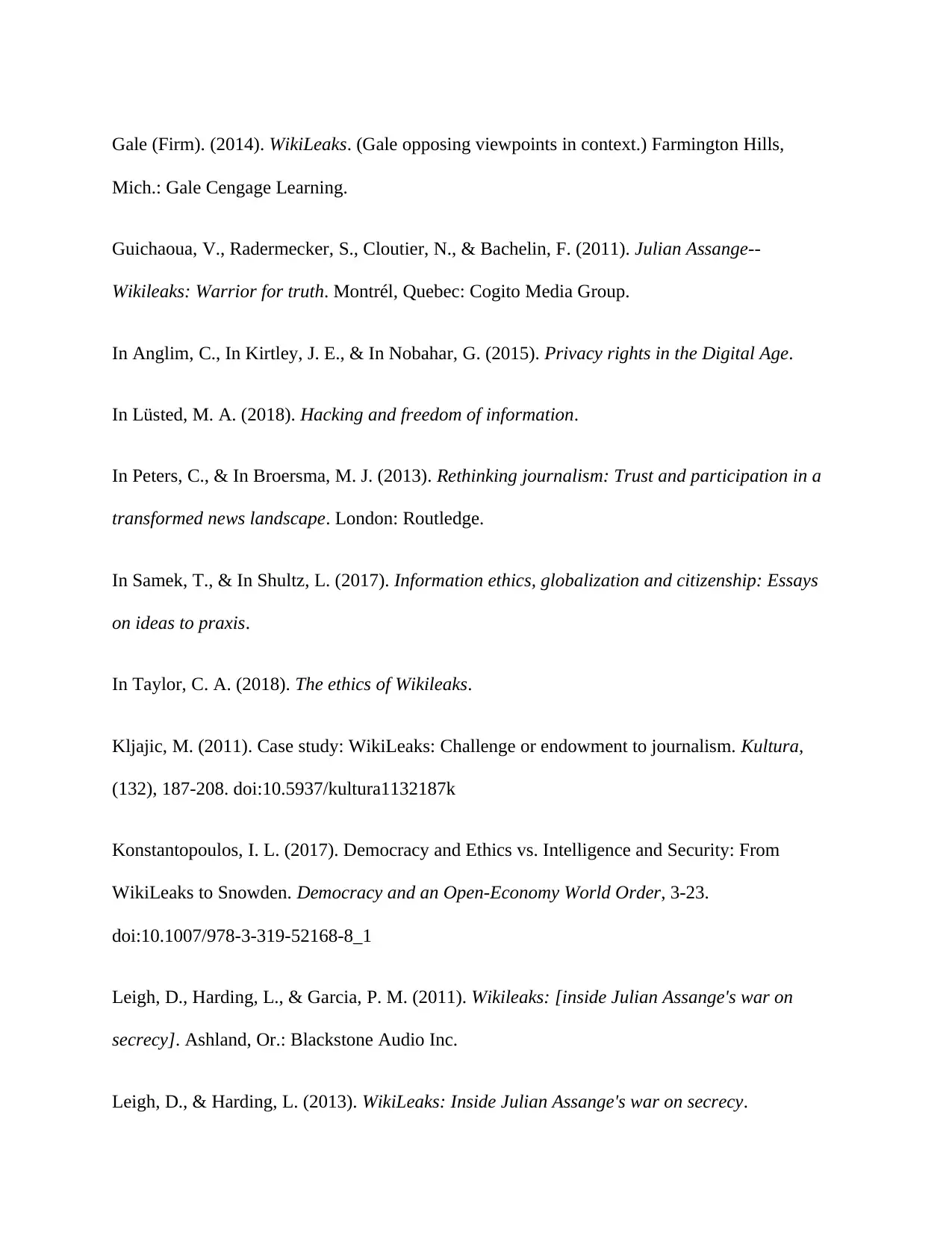
Gale (Firm). (2014). WikiLeaks. (Gale opposing viewpoints in context.) Farmington Hills,
Mich.: Gale Cengage Learning.
Guichaoua, V., Radermecker, S., Cloutier, N., & Bachelin, F. (2011). Julian Assange--
Wikileaks: Warrior for truth. Montrél, Quebec: Cogito Media Group.
In Anglim, C., In Kirtley, J. E., & In Nobahar, G. (2015). Privacy rights in the Digital Age.
In Lüsted, M. A. (2018). Hacking and freedom of information.
In Peters, C., & In Broersma, M. J. (2013). Rethinking journalism: Trust and participation in a
transformed news landscape. London: Routledge.
In Samek, T., & In Shultz, L. (2017). Information ethics, globalization and citizenship: Essays
on ideas to praxis.
In Taylor, C. A. (2018). The ethics of Wikileaks.
Kljajic, M. (2011). Case study: WikiLeaks: Challenge or endowment to journalism. Kultura,
(132), 187-208. doi:10.5937/kultura1132187k
Konstantopoulos, I. L. (2017). Democracy and Ethics vs. Intelligence and Security: From
WikiLeaks to Snowden. Democracy and an Open-Economy World Order, 3-23.
doi:10.1007/978-3-319-52168-8_1
Leigh, D., Harding, L., & Garcia, P. M. (2011). Wikileaks: [inside Julian Assange's war on
secrecy]. Ashland, Or.: Blackstone Audio Inc.
Leigh, D., & Harding, L. (2013). WikiLeaks: Inside Julian Assange's war on secrecy.
Mich.: Gale Cengage Learning.
Guichaoua, V., Radermecker, S., Cloutier, N., & Bachelin, F. (2011). Julian Assange--
Wikileaks: Warrior for truth. Montrél, Quebec: Cogito Media Group.
In Anglim, C., In Kirtley, J. E., & In Nobahar, G. (2015). Privacy rights in the Digital Age.
In Lüsted, M. A. (2018). Hacking and freedom of information.
In Peters, C., & In Broersma, M. J. (2013). Rethinking journalism: Trust and participation in a
transformed news landscape. London: Routledge.
In Samek, T., & In Shultz, L. (2017). Information ethics, globalization and citizenship: Essays
on ideas to praxis.
In Taylor, C. A. (2018). The ethics of Wikileaks.
Kljajic, M. (2011). Case study: WikiLeaks: Challenge or endowment to journalism. Kultura,
(132), 187-208. doi:10.5937/kultura1132187k
Konstantopoulos, I. L. (2017). Democracy and Ethics vs. Intelligence and Security: From
WikiLeaks to Snowden. Democracy and an Open-Economy World Order, 3-23.
doi:10.1007/978-3-319-52168-8_1
Leigh, D., Harding, L., & Garcia, P. M. (2011). Wikileaks: [inside Julian Assange's war on
secrecy]. Ashland, Or.: Blackstone Audio Inc.
Leigh, D., & Harding, L. (2013). WikiLeaks: Inside Julian Assange's war on secrecy.
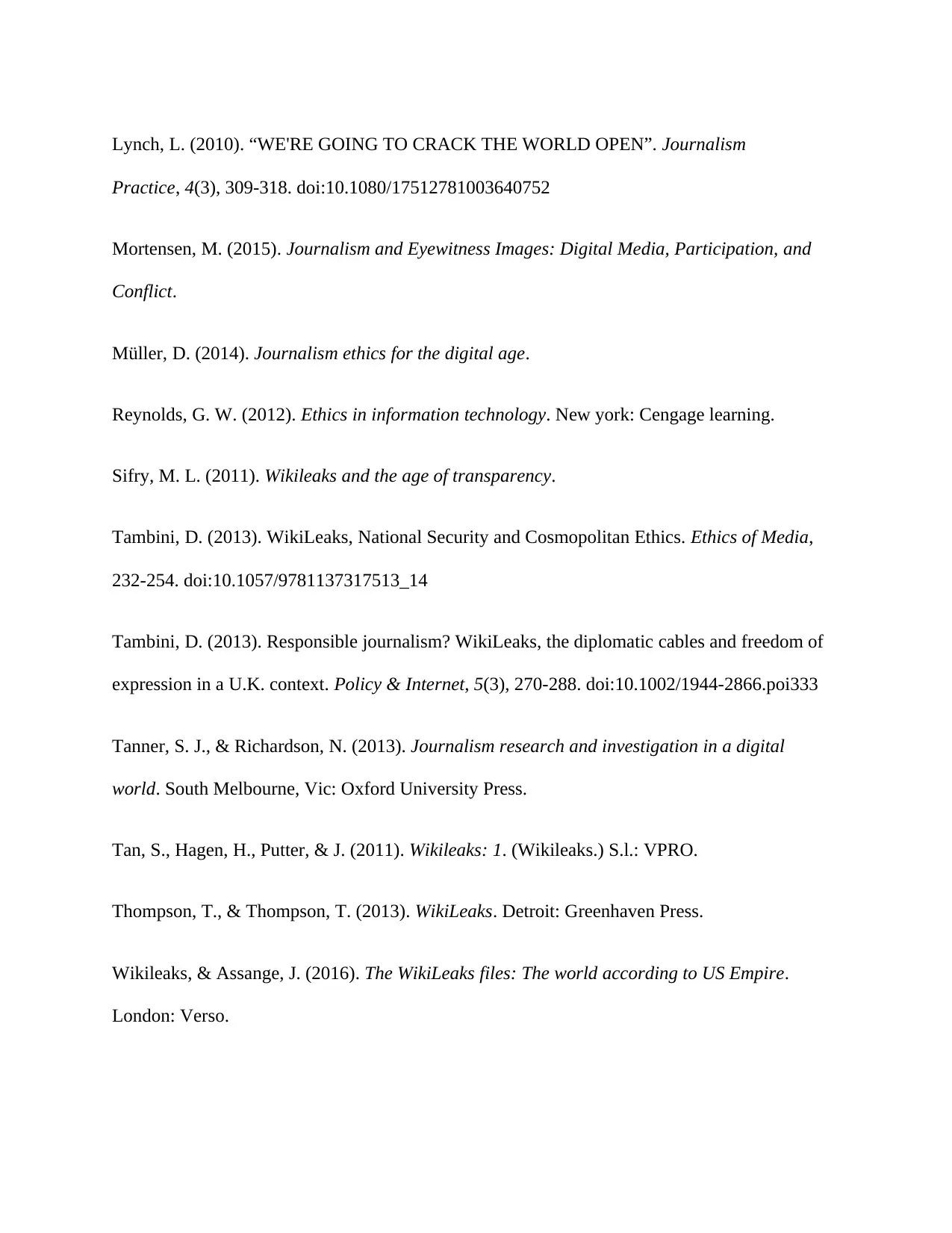
Lynch, L. (2010). “WE'RE GOING TO CRACK THE WORLD OPEN”. Journalism
Practice, 4(3), 309-318. doi:10.1080/17512781003640752
Mortensen, M. (2015). Journalism and Eyewitness Images: Digital Media, Participation, and
Conflict.
Müller, D. (2014). Journalism ethics for the digital age.
Reynolds, G. W. (2012). Ethics in information technology. New york: Cengage learning.
Sifry, M. L. (2011). Wikileaks and the age of transparency.
Tambini, D. (2013). WikiLeaks, National Security and Cosmopolitan Ethics. Ethics of Media,
232-254. doi:10.1057/9781137317513_14
Tambini, D. (2013). Responsible journalism? WikiLeaks, the diplomatic cables and freedom of
expression in a U.K. context. Policy & Internet, 5(3), 270-288. doi:10.1002/1944-2866.poi333
Tanner, S. J., & Richardson, N. (2013). Journalism research and investigation in a digital
world. South Melbourne, Vic: Oxford University Press.
Tan, S., Hagen, H., Putter, & J. (2011). Wikileaks: 1. (Wikileaks.) S.l.: VPRO.
Thompson, T., & Thompson, T. (2013). WikiLeaks. Detroit: Greenhaven Press.
Wikileaks, & Assange, J. (2016). The WikiLeaks files: The world according to US Empire.
London: Verso.
Practice, 4(3), 309-318. doi:10.1080/17512781003640752
Mortensen, M. (2015). Journalism and Eyewitness Images: Digital Media, Participation, and
Conflict.
Müller, D. (2014). Journalism ethics for the digital age.
Reynolds, G. W. (2012). Ethics in information technology. New york: Cengage learning.
Sifry, M. L. (2011). Wikileaks and the age of transparency.
Tambini, D. (2013). WikiLeaks, National Security and Cosmopolitan Ethics. Ethics of Media,
232-254. doi:10.1057/9781137317513_14
Tambini, D. (2013). Responsible journalism? WikiLeaks, the diplomatic cables and freedom of
expression in a U.K. context. Policy & Internet, 5(3), 270-288. doi:10.1002/1944-2866.poi333
Tanner, S. J., & Richardson, N. (2013). Journalism research and investigation in a digital
world. South Melbourne, Vic: Oxford University Press.
Tan, S., Hagen, H., Putter, & J. (2011). Wikileaks: 1. (Wikileaks.) S.l.: VPRO.
Thompson, T., & Thompson, T. (2013). WikiLeaks. Detroit: Greenhaven Press.
Wikileaks, & Assange, J. (2016). The WikiLeaks files: The world according to US Empire.
London: Verso.
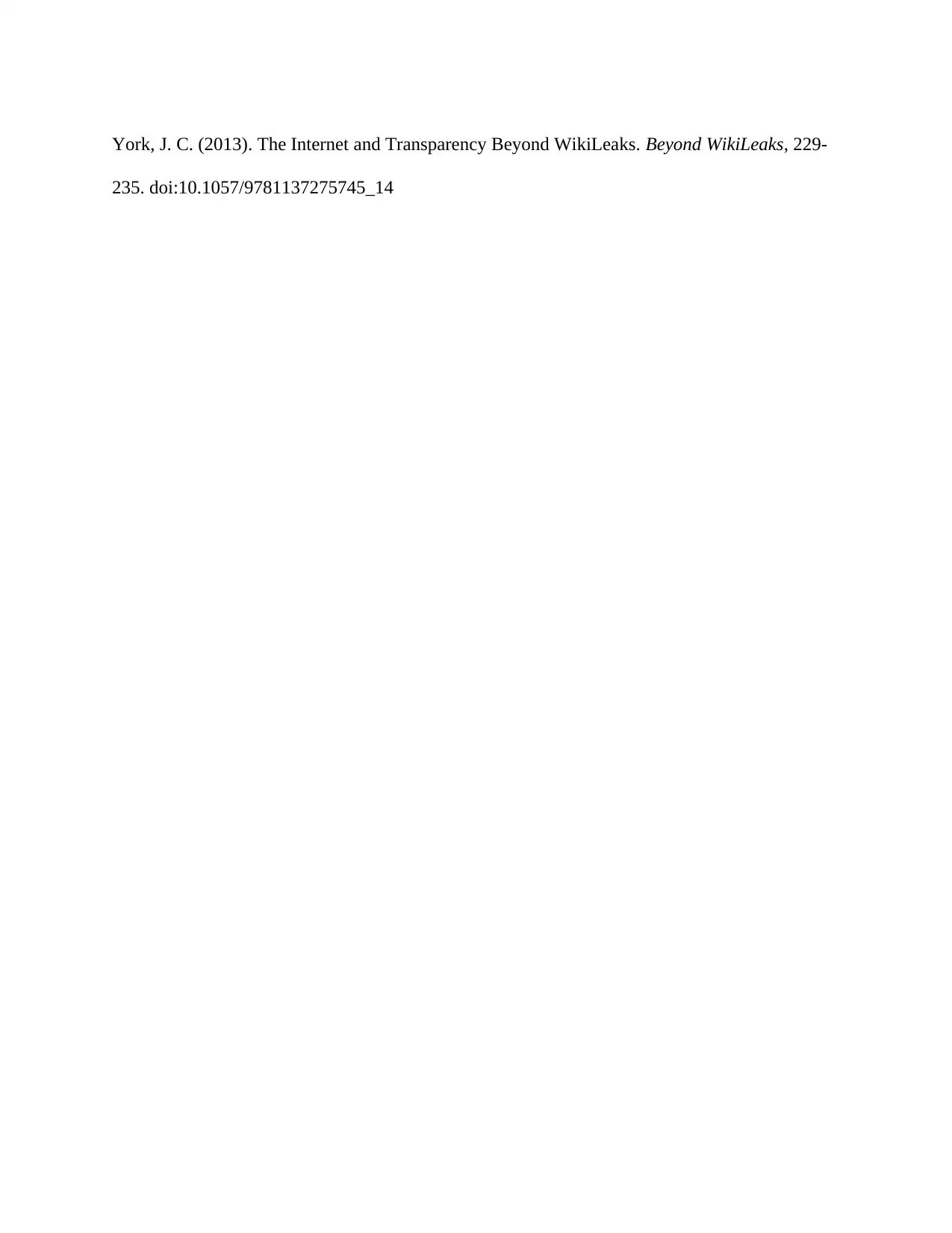
York, J. C. (2013). The Internet and Transparency Beyond WikiLeaks. Beyond WikiLeaks, 229-
235. doi:10.1057/9781137275745_14
235. doi:10.1057/9781137275745_14
1 out of 22
![[object Object]](/_next/static/media/star-bottom.7253800d.svg)
